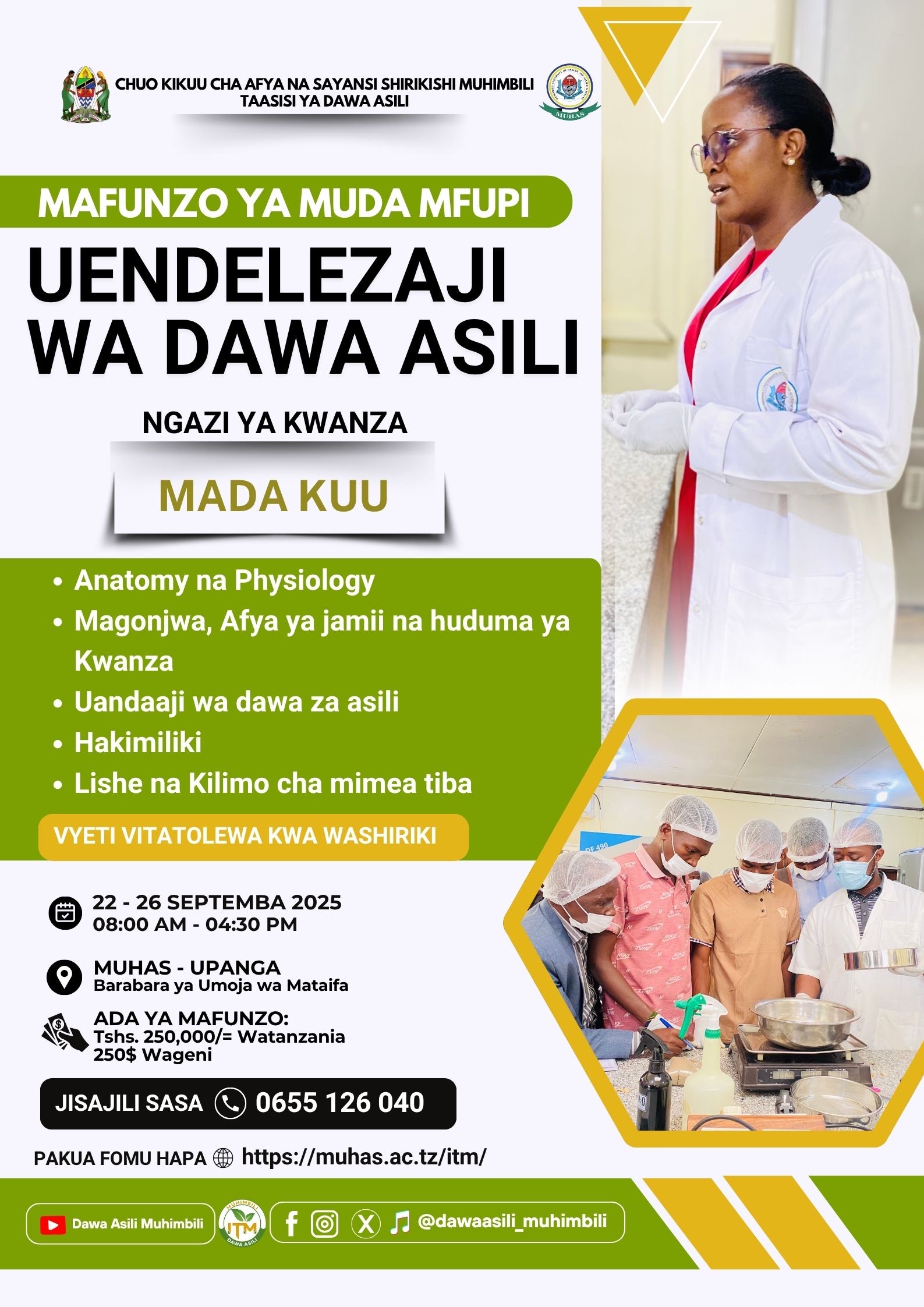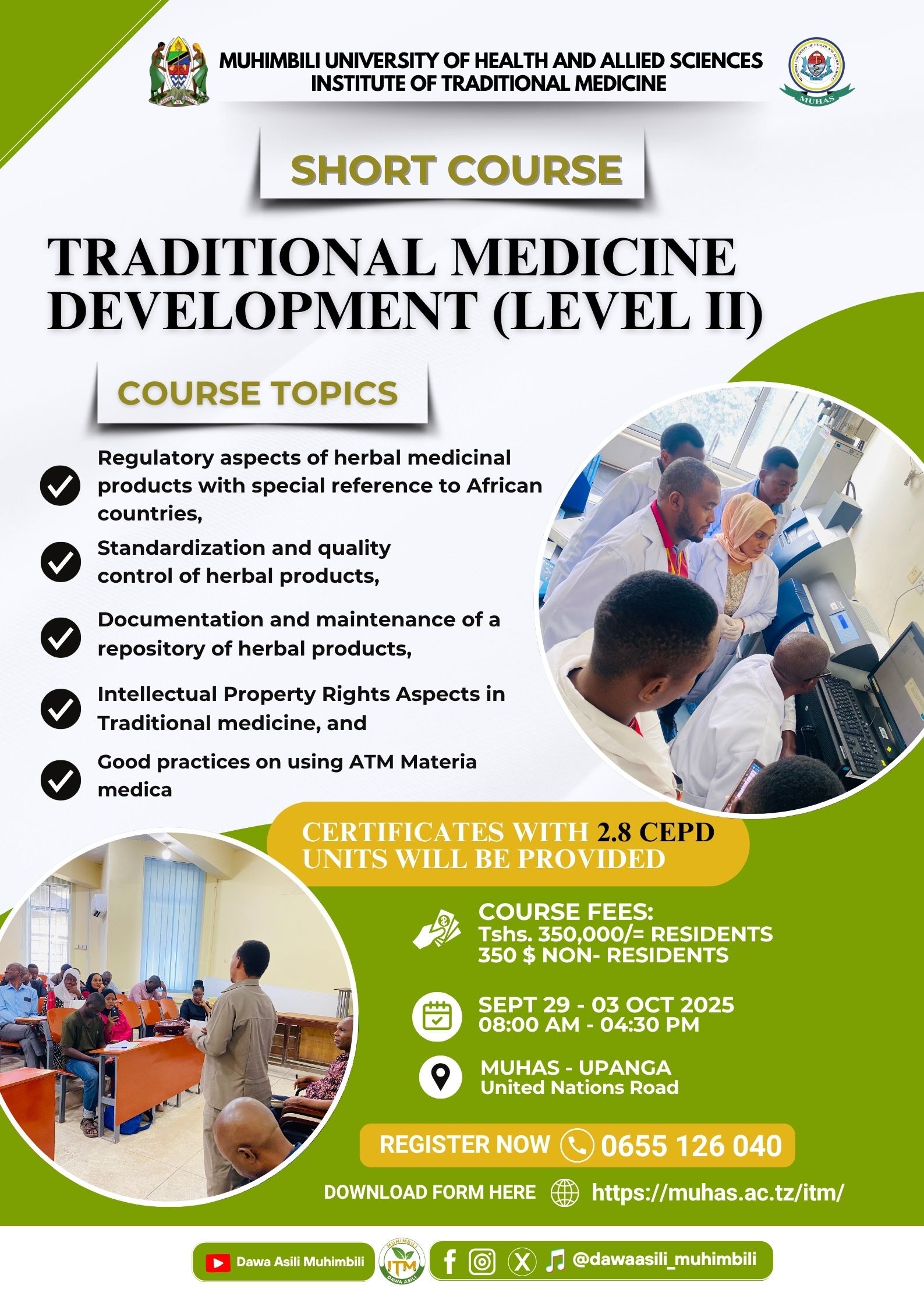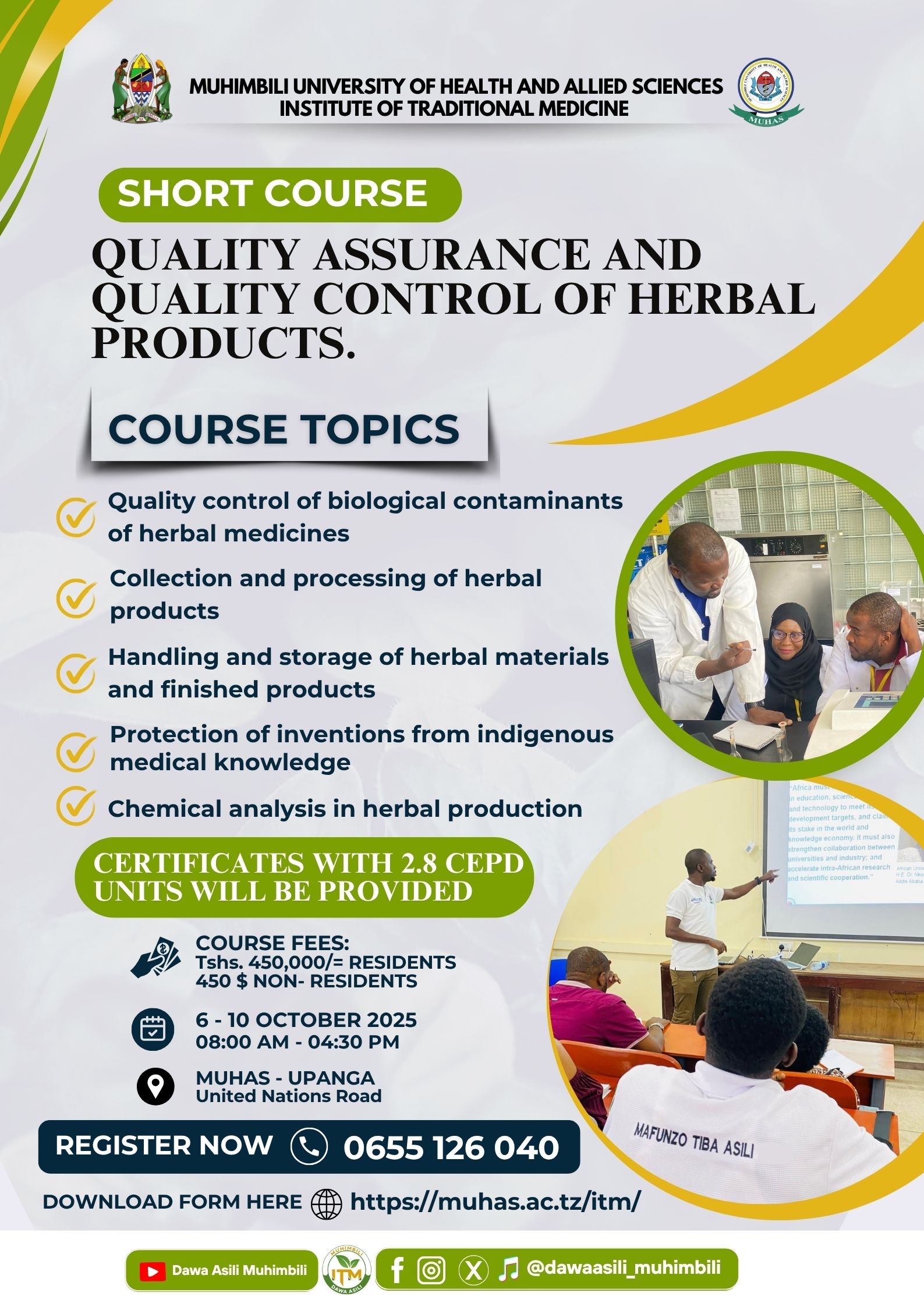INSTITUTE OF TRADITIONAL MEDICINE
The Institute of Traditional Medicine, previously known as Traditional Medicine Research Unit was established under the Muhimbili University College of Health Sciences, Act of Parliament no. 9 of 1991, Section 10 (1) (c). The Act provided for an Institute Board that reports to the Academic Board of the College. The Institute is charged with the responsibility to research into traditional healing systems, in Tanzania, to identify useful practices which can be adopted and also to identify useful materia medica which can be modernized and developed into drugs for use to improve human health.
THE VISION
To become the leading institution in Africa in training, consultancy and research in developing quality herbal medicines for the healthy well being of the people, and contribute to poverty reduction through community based cultivation of specific medicinal plants
THE MISSION
To research on traditional medicines and promote the development of standardized herbal and plant derived pharmaceuticals and useful non-material aspects of traditional medicine through teaching and consultancy for the improvement of the health of the Tanzanian people
About ITM
Since 1968 when the Dar es Salaam College of the University of East Africa established its Faculty of Medicine, it was interested in the development of traditional medicine. In 1973 the University Planning Committee accepted the establishment of Traditional Medicine Research Unit which became operational in 1974. The unit had three sections namely Botany, Phytochemistry and Pharmacology which have now been transformed to departments ofthe Institute of Traditional Medicine
The Institute of Traditional Medicine was established Through parliamentact no. 9 of 1991, Section 10 (1) (c), under the Muhimbili University College of Health Sciences which in 2007 became Muhimbili University of Health and Alled Sciences, established Article 1 of the Charter of Incorporation; in line with the Universities act no 7 of 2005.The Institute has three Departments;known asDepartment of Medical Botany, Plant Breeding and Agronomy;Department of Natural Products Development and Formulation; and the Department of Biological and Preclinical Studies. It is expected that three more departments; namely Department of Medical Anthropology; Department of Clinical Evaluation and Department of pharmaceutical formulations and production will be established.
The Institute of Traditional Medicine is charged with the responsibility to research into traditional healing systems, in Tanzania, to identify useful materiamedica which can be modernized and developed into drugs and traditional healing practices which can be adopted for use to improve human health.
The Institute has the following opportunities in accomplishing its responsibilities:
- The country with large wealth of medicinal plants, a few of which have been exploited. These represent potential source of curative products and drug
- Over 75,000 traditional healers in Tanzanian Mainland. These are the custodians of the knowledge about plants with medicinal value. They will assist the Institute in exploiting the wealth of medicinal plants found in different parts of the country.
- Countrywith unique in the world. Some plants are only found in Tanzania. Due to this reason it is possible to attract both national and international collaborators in research on the medicinal value of these plants.
- Presence of medicinal plant farms, which can be used for commercial cultivation of medicinal plants. The same plants can be used to prepare galenicals for use. Establishment of a herbal pharmacy for dispensing these preparations will generate funds for the institute
Our Programmes
PROGRAMMES OFFERED AT THE INSTITUTE
Since 2009, the Institute embarked on training through establishment of undergraduate and Postgraduate programs aimed at producing graduates who will further strengthen the development of herbal medicine for the health of Tanzanians.
Currently, the institute offers five types of programs: Diploma in Herbal Medicine Development, MSc. Herbal Products Development, Master of Science of Quality Assurance and Quality Control of Herbal products, PhD program, and CEPD short courses.
- Diploma in Herbal Medicine Development
Eligibility
O-Level Certificate with at least D grades in Physics, Chemistry, Biology, Mathematics, and English. A-Level Certificate is an added advantage. OR Certificate in Pharmaceutical Sciences, Pharmacy, Clinical Medicine, or Laboratory Sciences with a minimum GPA of 3.0 (NACTE or TCU-recognized institution). At least a D grade in Mathematics and English at O-Level.
- Herbal Products Development
Eligibility
Graduates with a minimum of lower second-class degree with GPA 2.7 in the following programmes: Pharmacy and B.Sc. degree having Chemistry and or Biology with at least a pass in chemistry at A- Level.
- Quality Assurance and Quality Control of Herbal Products
Eligibility
Graduates with a minimum of lower second-class degree with GPA 2.7 out 5 in the following programs: Bachelor of Pharmacy, Bachelor in Pharmaceutical Management after completing one year of internship, bachelor’s degrees having Chemistry, Food technology and Nutrition, Laboratory technology, Microbiology, Environmental chemistry and related fields, with at least a pass in chemistry at A- Level.
- Doctor of Philosophy Degree (PhD)
The PhD by research and publication is offered for 3 to 4 years at the institute in the areas of traditional, herbal medicine development
Admission of a candidate for the Doctor of Philosophy degree of the Muhimbili University of Health and Allied Sciences shall study for a 3–4-year period. The candidate must have the following qualifications:
Master’s degree from this University or its predecessor, or an equivalent master’s degree from a recognized University. Certificates obtained from unlisted Universities and institutions of higher learning shall be subject to approval by the Tanzania Commission for Universities.
- CEPD Short Courses
These are structured short courses delivered over three weeks, with each level covered in one week.
- Short Course on Traditional Medicine Development Level I: Participants are introduced to Anatomy and Physiology, Diseases, Community Health and First Aid, Preparation of Traditional Medicines, Intellectual Property Rights, Nutrition, and the Cultivation of Medicinal Plants.
- Short Course on Traditional Medicine Development Level II: The curriculum covers Regulatory Aspects of Herbal Medicinal Products with a focus on African countries, Standardization and Quality Control of Herbal Products, Documentation and Maintenance of Herbal Product Repositories, Intellectual Property Rights in Traditional Medicine, and Good Practices in the Use of ATM (African Traditional Medicine) Materia Medica.
- Short Course on Quality Assurance and Quality Control of Herbal medicines: Participants learn about Quality Control for Biological Contaminants in Herbal Medicines, Collection and Processing of Herbal Products, Proper Handling and Storage of Herbal Materials and Finished Products, Protection of Indigenous Medical Knowledge Inventions, and Chemical Analysis in Herbal Product Development.
Upon successful completion of Levels Two and Three, participants are awarded certificates with 2.8 CEPD points.
Our Departments
Natural Products Development And Formulations
DEPARTMENT OF NATURAL PRODUCTS DEVELOPMENT AND FORMULATION
- Overview
The Department of Natural Products Development and Formulation is one of the three key departments under the Institute of Traditional Medicine (ITM). Its core responsibilities include research, training, and providing consultancy services in the field of natural products derived from traditional materia medica. A major focus of the department is the development and formulation of scientifically validated herbal products aimed at enhancing public health.
The department comprises a Production Unit, which includes a Good Manufacturing Practice (GMP) Laboratory for the production of herbal medicines and a Natural Products Research Laboratory dedicated to advanced scientific investigations. The team includes ten (10) staff members, five academic (8) and two (2) technical personnel.
The activities of the department include postgraduate training, extraction of active extracts and fractions from plants, minerals, and animal sources traditionally used in medicine. It also focuses on the characterization, identification, and bioactive compounds, formulation and standardization of herbal preparations, laboratory-scale production of herbal medicines and quality control of medicinal ingredients from both indigenous and exotic plant sources.
- Research Focus
The department undertakes research in alignment with MUHAS prioritized thematic areas. Ongoing projects are organized under the following themes:
- Evaluation of AMR Awareness and Practice among pharmaceutical personnel in community settings – Tanzania.
- In silico and In vitro Assessment of Bioactive Compounds from Tanzanian medicinal plants for cancer therapy (Funded by SIDA).
- Impact of Harvest Age and Climatic Variation on phytochemical composition of Prunus africana for BPH management.
- Training Programmes
The department plays a vital role in undergraduate and postgraduate training, particularly in MSc and PhD programs related to Traditional Medicine Development. It co-hosts the following programs;
- Diploma in Herbal Medicine Development
- Traditional Medicines Development
- Quality Assurance and Quality Control of Herbal Products
- Doctor of Philosophy Degree (PhD)
The department is also active in delivering short courses tailored for health practitioners and traditional medicine professionals.
- Consultancy Services
The department provides consultancy services in the following specialized areas:
- Phytochemical screening and analysis of bioactive compounds from medicinal plants
- Formulation and standardization of herbal medicines
- Stability studies of herbal products
- Conducting antioxidant activity assays
Biological And Pre-Clinical Studies
Biological And Pre-Clinical Studies
The Department of Biological and Pre-Clinical Studies is one of the three departments in the Institute of Traditional Medicine (ITM) involved in research, training and consultancy services. The Department has eight (8) academic members of staff including Associate Research Professors (2), Senior Research Fellows (1), Research Fellow (1), Assistant Lecturer (3) and Tutorial Assistant (1). In addition, the Department has two technical staff including Laboratory Scientist and Laboratory Assistant.
Major Functions
(i) Screening of medicinal plants collected from traditional healers to establish the presence of pharmacological activity.
(ii) To carry out toxicological studies on medicinal plant extracts to generate knowledge which will form the basis for:
- Assessment of the safety of different traditional medicines used in the country.
- Recommendation to the public on the safety of traditional medicines prepared by Traditional health Practitioners.
- Regulatory approval of newly developed herbal formulations or drugs
(iii) To search for reliable, simple and reproducible bioassays for preliminary screening of medicinal plant extracts.
(iv) To identify the mechanism of action of traditional medicines used by Traditional health Practitioners and suggest possible lines of development of products from isolated active compounds.
(v) To collaborate with the Department of Natural Products and Formulation To carry out standardization of indigenous and exotic medicinal plant products.
(vi) To collaborate with the Department of Natural Products and Formulation in the Bio-assay guided fractionation and isolation of active compounds from plant extracts.
In future, the Institute of Traditional Medicine intends to establish a related Department that will be responsible for Clinical Evaluation of traditional medicines. The new Department will have the following functions:
(i) To plan and conduct clinical trials to establish the safety and efficacy of traditional medicines within ethical and scientific requirements.
(ii) To document the relevant practices of Traditional health Practitioners as a means to identify effective therapies which can be taken up for drug development.
(iii) To monitor short term and long term toxicities due to traditional medicines.
(iv) To generate clinical data to support regulatory approval of traditional medicines.
- Research
HIV/AIDS Projects:
Researchers and students from this Department collaborated with other researchers within ITM and from outside Tanzania in HIV research works. There were studies on various plants including of the genus Combretum, Terminalia, Garcinia and Carissa. These species have been earmarked as potential sources of bioactive anti-HIV-1 compounds. Screening of the crude extracts, fractions and isolated compounds for HIV-1 PR and RT inhibition and HIV-1 neutralization activities were reported.
In-vivo and in-vitro antimalarial testing:
Both, in-vivo and in vitro testing for antimalaria activity has been established. In vivo testing using Plasmodium berghei malaria model in mice has been strengthened by involving undergraduate and postgraduate (MSc & PhD) students. Two academicians in the department were trained on malaria parasite culture and in vitro testing for anti-plasmodial activity. In addition, Plasmodium falciparum malaria parasites and basic equipment for in-vitro testing have been procured and a laboratory dedicated for cell culture work has been established.
Pest and vector control for health and crop protection.
Studies geared into isolation of active compounds for pest and vector control for health and crop protection have been initiated. Facilities to test for mosquitocidal activities have been established whereby there are three on-going projects. One of the projects is seeking to isolate compounds and formulate mosquito larvicidal agents. The other two projects are searching for botanicals for crop protection in collaboration with Sokoine University of Agriculture.
Antimicrobial testing:
This program mainly involves in vitro evaluation of plant extracts, fractions and isolated compounds against bacteria and fungi using disc diffusion and microdilution assays. Many projects were carried out which led to the isolation of several active compounds against bacteria and fungi.
Cytotoxicity testing:
The brine shrimp lethality assay is a well-established in the Department as a preliminary test for toxicity, as a screening tool for possible anticancer activity and other non-specific biological activities. Recently, the Department has established Cell and Tissue Culture Laboratory with important equipment to evaluate cytotoxic and anticancer activity on mammalian cells.
Anti convulsant testing:
Testing for anticonvulsant activity using the chemical-induced convulsions model is well established in the Department. The convulsions in animals (mice) are induced using picrotoxin, isoniazid and pentylenetetrazol convulsant agents. This is one of the areas which generated publications and further studies are ongoing.
Anti-TB Natural Products research:
Search for anti-TB compounds from Tanzanian medicinal plants is an on-going process. Two anti-TB assays have been established: Whole cell inhibition assay (using Mtb marker organisms), and the enzyme assay which inhibits Mycothione reductase redox cycle. Furthermore, various analytical instruments for the assays have been procured.
Anti-ulcers research
Currently several models of anti-ulcer studies have been in use. The Ethanol/Hydrochloric acid, aspirin and indomethacin models have been used to induce gastric ulcers in rats. Using these models, several plant species were tested for their protective effect and some were found to be gastro-protective. The Department is intending to develop other peptic ulcer models to facilitate understanding the mechanisms of antiulcer activity of plant extracts. Helicobacter pylori is implicated in peptic ulcer disease and therefore testing herbal extracts against this bacterium can provide an additional information regarding the use of medicinal plants in the treatment of peptic ulcers. The Department is now in the process of getting the standard strains of this bacterium so as to be used as a screening tool.
Anti-diabetes research
Oral glucose Tolerance Test (OGTT) and streptozotocin-induced (STZ) diabetes are two diabetes models established in the department for screening of medicinal plants with hypoglycaemic potential. A number of publications have been obtained through the research works in this area.
- Training programme
The department participates in training of postgraduate students; by teaching three modules namely TM 604-1 Basic Biochemistry and Molecular Biology Techniques, TM 604-2 General Principles of the Quantitative and Qualitative aspects of Drug Action, and TM 604-3 Pre-Clinical Safety Testing and Good Laboratory Practice to MSc Traditional Medicine Development Programme and PhD students. The members of staff in the department are also involved in teaching courses offered in other Departments at MUHAS and short courses on Traditional Medicine Development to Traditional Health Practitioners every year. The senior academicians are also involved in supervision of MSc Dissertations and PhD Theses.
- Consultancy
Some of the consultancies which have been done include evaluation of medicinal plants for anti-ulcer activity and evaluation of a dental formula. Other areas of consultancy include training of Traditional Health Practitioners and conducting different bioassays that are available in the department.
Medical Botany, Plant Breeding And Agronomy
Medical Botany, Plant Breeding And Agronomy
The department of Medical Botany, Plant Breeding and Agronomy is one of the three departments of the Institute of Traditional Medicine. It was established in 2006. It is charged with handling major activities including taxonomic identification and documentation of plants which are used by Traditional Healers and Traditional Birth Attendants, conduction of economic mapping of the spontaneous flora of Tanzania to identify the qualitative and quantitative genetic resources in medicinal and aromatic plants, promotion on conservation of medicinal and aromatic plant biodiversity in the country based on realistic in-situ and ex-situ sustainable programmes, agrobiological studies on medicinal and aromatic plants growing in the spontaneous flora in order to establish the ecophysiological and agrotechnological requirements needed for commercial exploitation, enhancement of the cultivation of important medicinal and aromatic plants to facilitate a sustainable economic harvesting of the natural resources without jeopardising the genetic germplasm, genetic, pathological, entomological and biochemical studies on prospective medicinal and aromatic plants in order to realise a sustainable utilization of medicinal/aromatic plants. Other activities include development and maintainnance of a rich herbarium of medicinal and aromatic plants for research, teaching and retrieval purposes, and to disseminate ethnobotanical and agronomical research information to scientists, students, traditional healers and general public through publications, seminars, pamphlets and workshops.
The research carried out at the department has helped to generate rich data on different disciplines. For example, currently over 5000 records and about 1500 species of medicinal plants are recorded. The study on distribution of some potential medicinal plants such as Prunus africana was done whereas their distribution was established. There is ex-situ conservation program of some exotic medicinal plants in the institute farms in Tanga, Coast and Arusha regions. The agronomic studies of some native plants of Tanzania such as Hypoxis, Orchids and Aloes is being done as such, some exotic species such as Artemisia, Hybiscus, Cynara, Pimpinella, Saponaria and Glycirrhiza are grown at the institute medicinal farms in Lushoto, Arusha and Kongowe. About 4500 records of the herbarium are already digitalized and shared with the TanBIF. Some framers in Kongowe ward ware trained on good agricultural practices. The Molecular lab laboratory has been established for plant DNA barcoding and there is living collection of Aloe and Hypoxis species at the background of ITM building
Future plans of the department includes establishment of medicinal plants Botanical garden, establishment of department of medical anthropology and recruitment of more staff with specialties in the areas of plant systematic, agronomy, medical anthropology, plant breeding, agriculture and botany.
- Research currently carried out by the department
- Growth appraisal and performance of Hypoxis species in Lushoto Medicinal farm
- Propagation tests of Glycirrhiza glabra and Pimpinella anisum in Lushoto and Meru/USA in Arusha
- Trial cultivation of wild collected Artemisia affra in Lushoto medicinal farm
- Comparison of the yield per stem for Hypoxis spp in Lushoto farm
- Training programme
- The department is involved in training Post Graduate students where the courses offered are:
TM 601: Traditional and Alternative Health Care Systems
TM 602: Medical Botany, Biosystematics, and Plant Breeding.
- Community outreach
- There is collaborative farming where local communities in Lushoto and Arusha Olmotonyi are involved in contractual cultivation of some medicinal plants such as Hibiscus subdariffa, Plantago lanceolata, Cynara Scolymus, Artemisia affra, Artemisia annua, Pimpinella anisum, Glycirhiza glabra etc for production of herbal medicines at the institute
Management Team

Ag. Director- Institute of Traditional Medicine
Dr. Pax Masimba (BSc, MSc, PhD), Senior Research Fellow,
Dr. Pax Masimba is the acting Director of the Institute of Traditional Medicine (ITM) at Muhimbili University of Health and Allied Sciences (MUHAS) since 2024. He holds a Bachelor of Veterinary Medicine and a Master of Veterinary Medicine in Microbiology from Sokoine University of Agriculture, and a PhD in Microbiology from the Swiss Tropical and Public Health Institute, University of Basel. He has received additional training in malaria parasite culture, HIV screening, NMR techniques, and climate-related research on medicinal plants. Since joining MUHAS in 2005, he has served in various academic and leadership roles, including 12 years as Head of Department. His research focuses on the discovery of antimicrobial, antimalarial, antidiabetic, anti-HIV, and anticancer agents from medicinal plants, with over 30 publications in peer-reviewed journals.

Head, Department of Natural Products Development and Formulation
Dr. Baraka S. Ndiege (BSc, MSc, PhD), Research Fellow,
Dr. Ndiege specializes in natural products chemistry, herbal drug formulation, and bioinformatics-driven drug discovery. He teaches and supervises research in herbal medicine development and quality control and is actively involved in short course facilitation. His work includes eco-friendly vector control and quality assurance of herbal products. He is a member of the Tanzania Chemical Society and has published in areas ranging from bioactive compounds to mosquito larvicidal assays.

Head, Medical Botany, Plant Breeding and Agronomy
Dr. Siri Abiudi (BSc, MSc, PhD),
Siri Abymike Abihudi obtained a Bachelor of Environmental Science (B. Env. Sci) at Makerere University (Uganda) in 2013 and an MSc in Traditional Medicine Development at Muhimbili University of Health and Allied Sciences (MUHAS-Tanzania) in 2014. In 2021, she completed PhD studies at Nelson Mandela African Institute of Science and Technology (NM-AIST-Tanzania), focusing on Ethnobotanical use, threat status, and optimal environmental germination conditions for conservation of Aloe species in Tanzania. Her research interest is in understanding the ethnobotanical uses of plant species, applying DNA barcoding and Metabarcoding to identify and determine their phylogenetic relationship, determining and categorizing their conservation status, and applying both traditional and tissue culture technology in propagating and ensuring their biodiversity conservation both in situ and ex-situ environments.

Head, Department of Biological and Pre-Clinical Studies
Jackson Mollel (BSc, MSc, PhD), Lecturer
Dr. Jackson’s current research focuses on the antiviral properties of Tanzanian medicinal plants. His research delves into the antiviral mechanism of action of medicinal plant extracts and the virological significance of escape mutations that arise under selective pressure from viral inhibitors isolated from plant extracts. His research centres on antiviral and general antimicrobial research, with a focus on medicinal plants.
Our Products
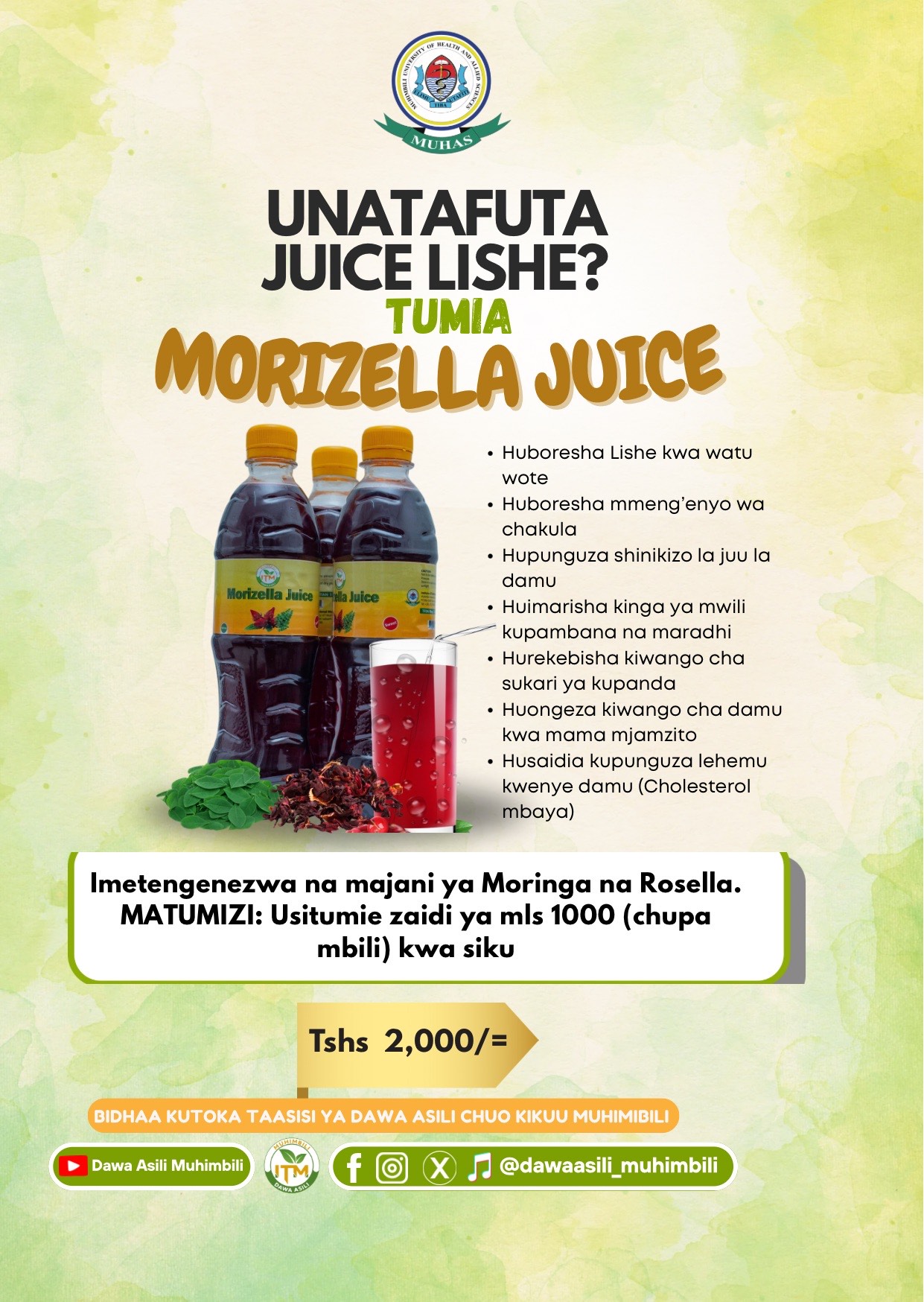
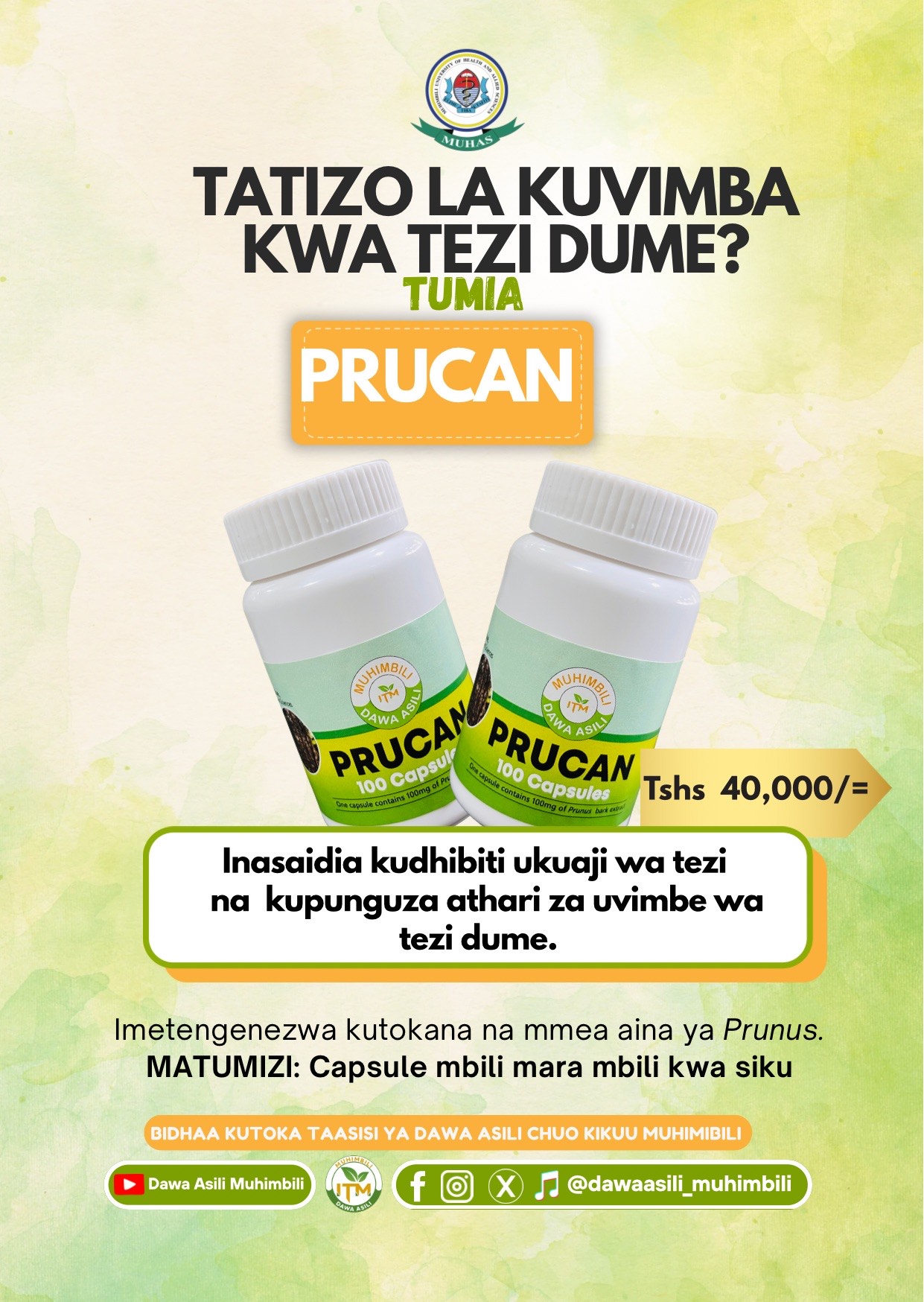
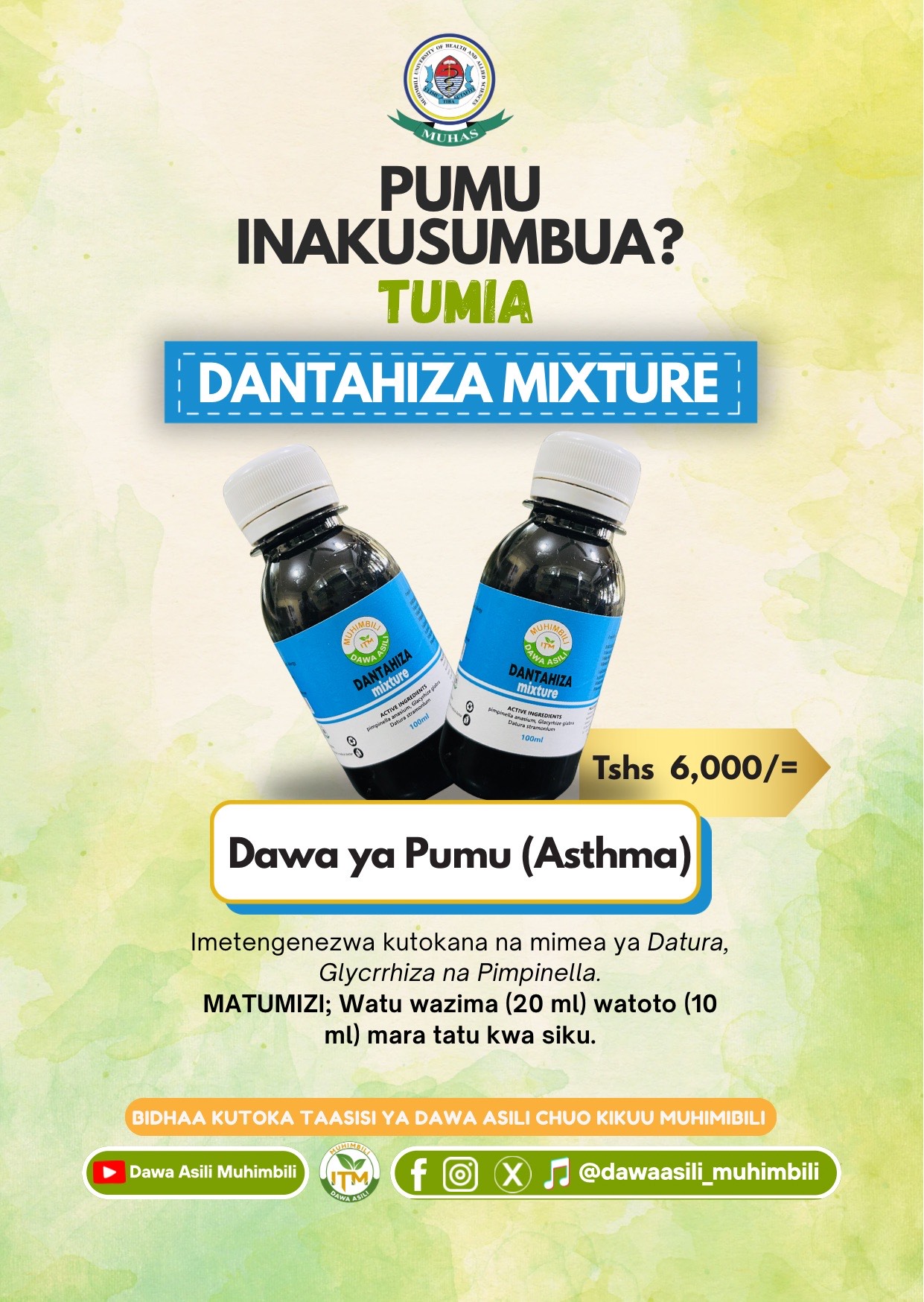
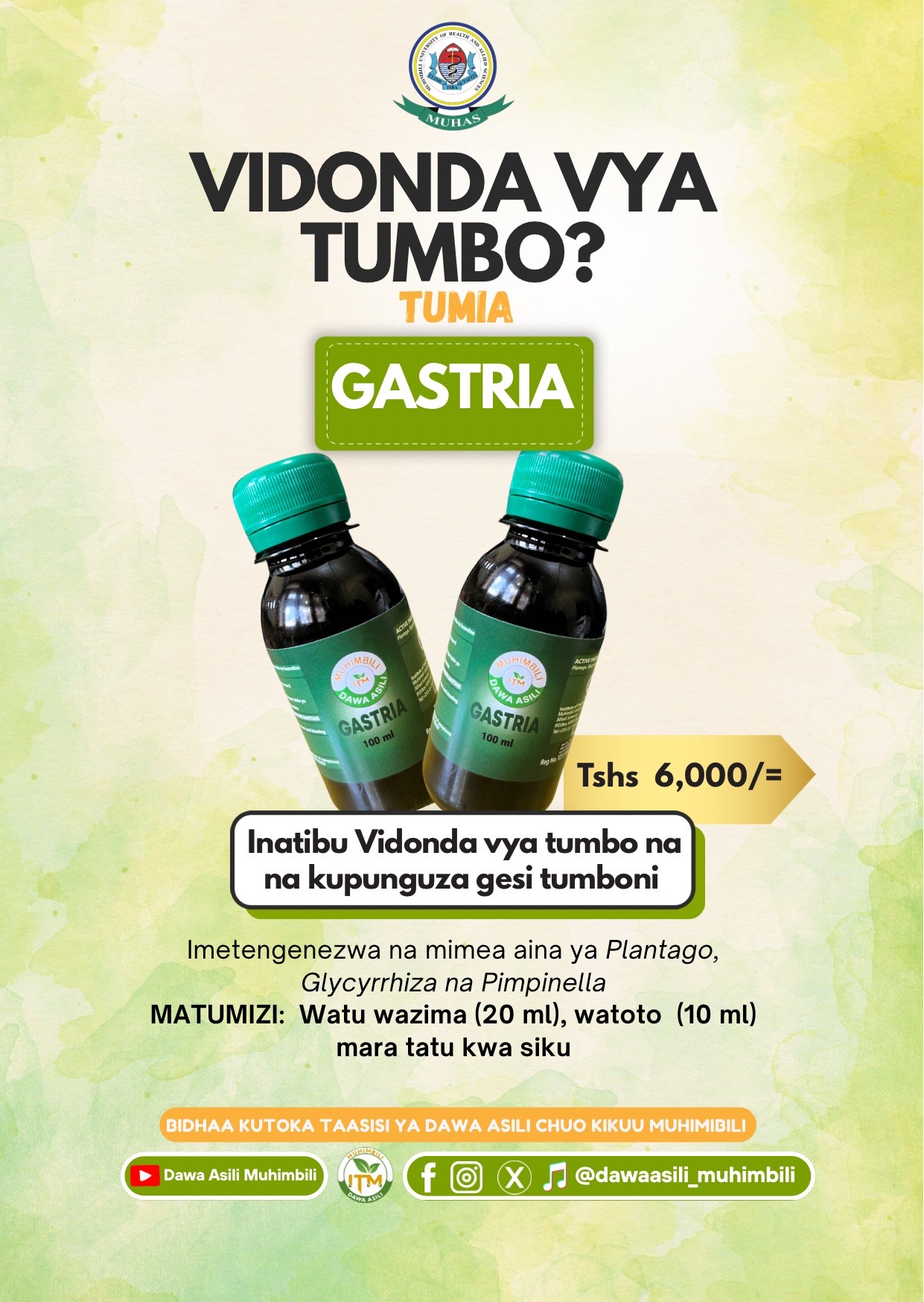
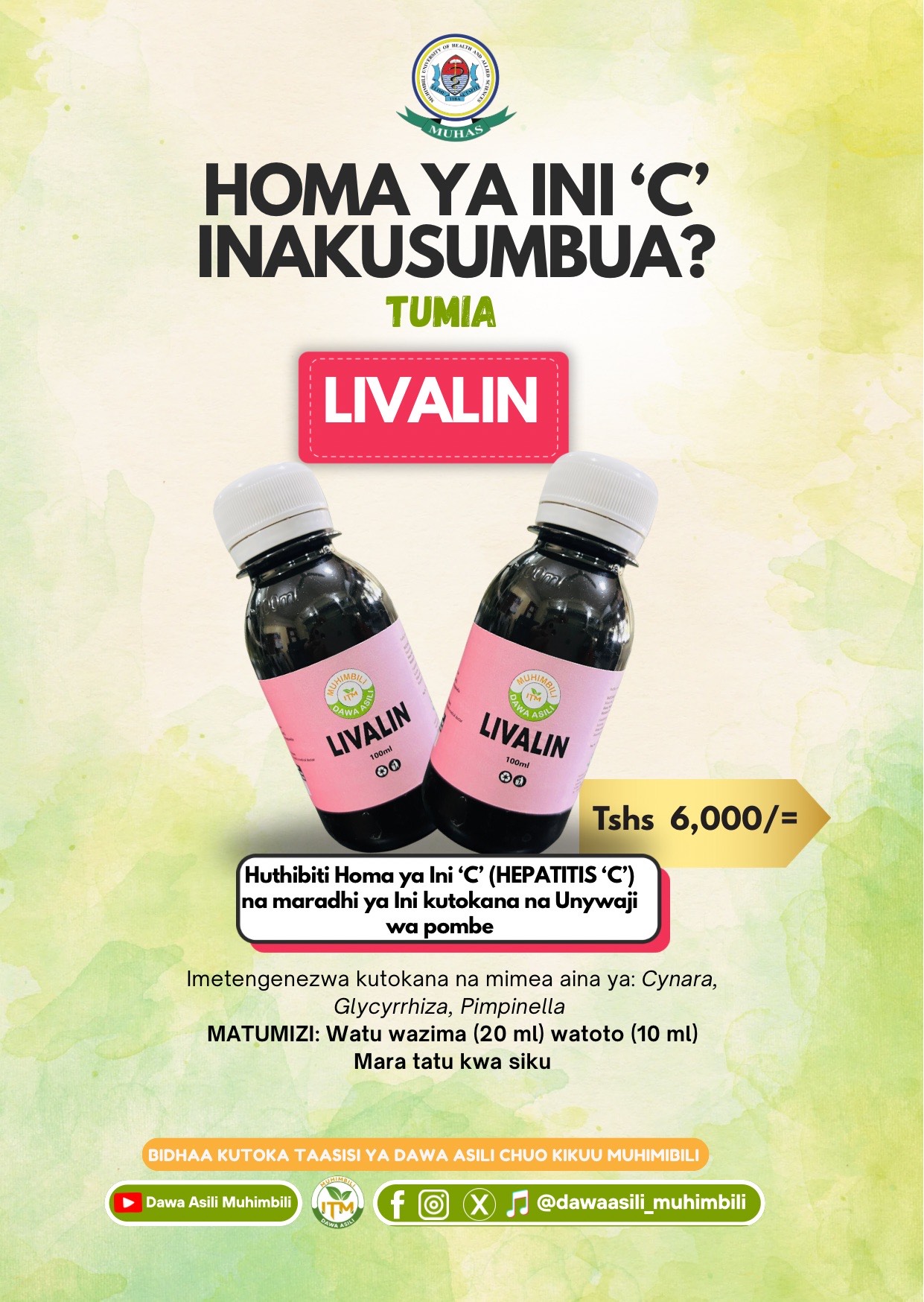

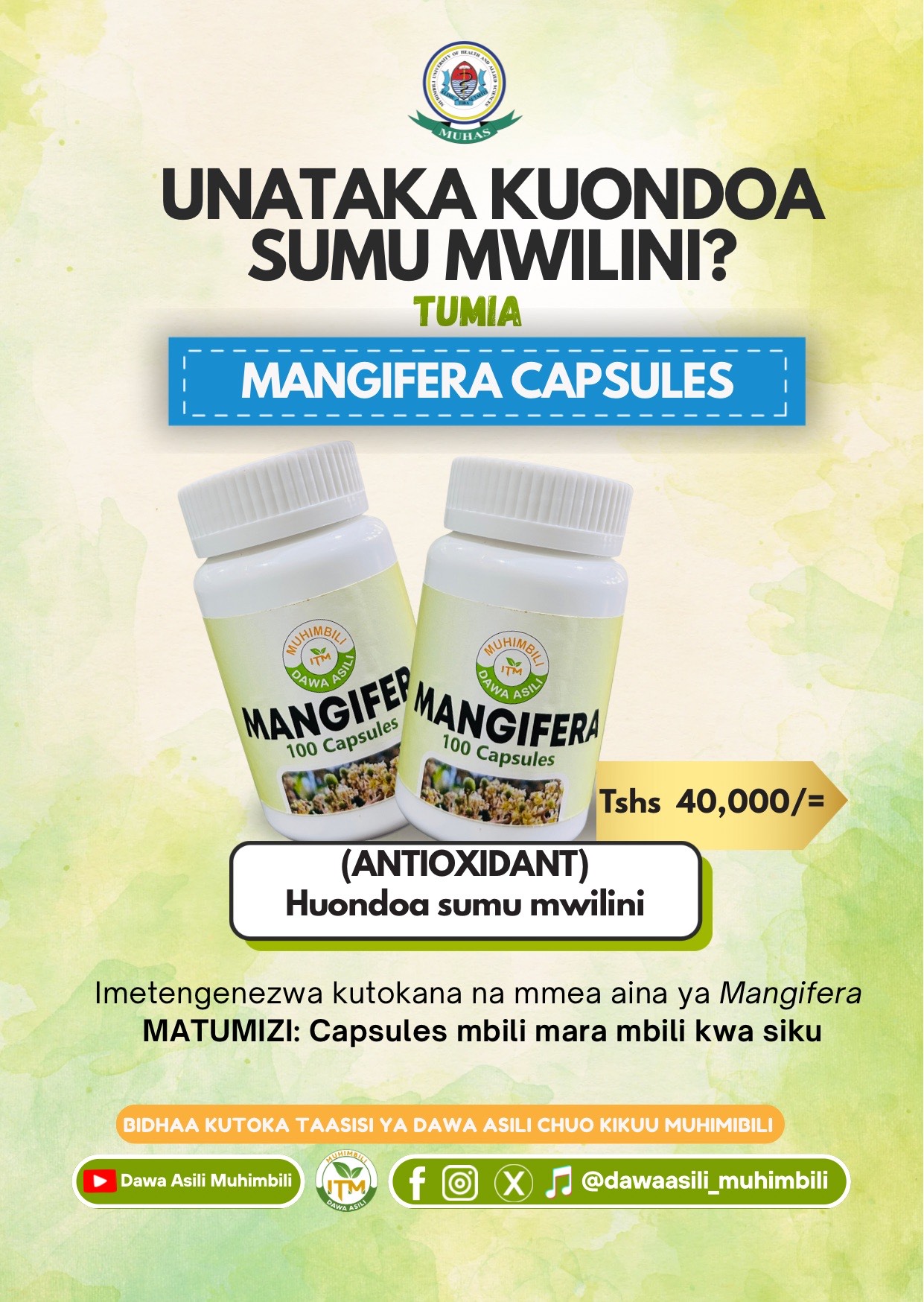
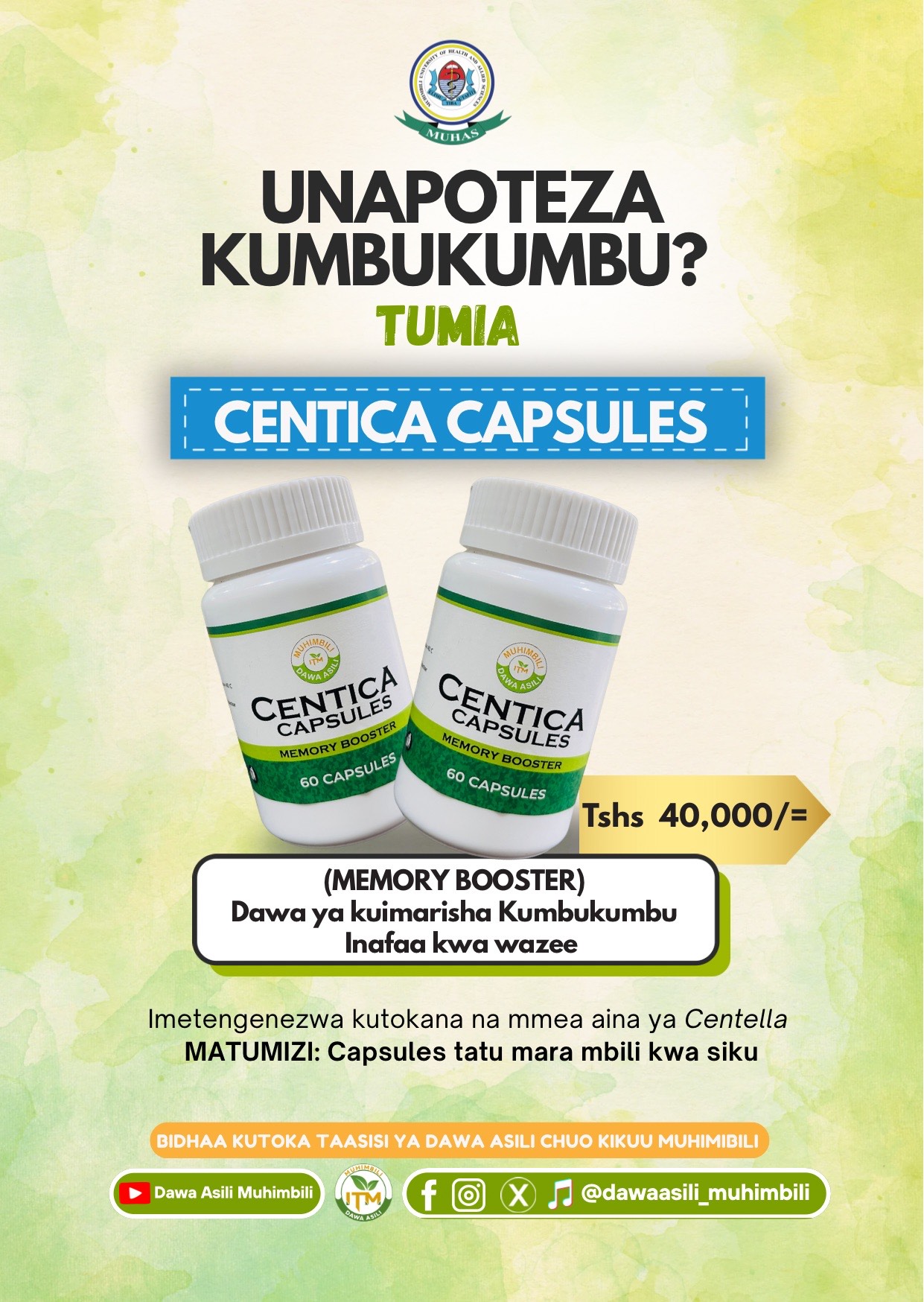
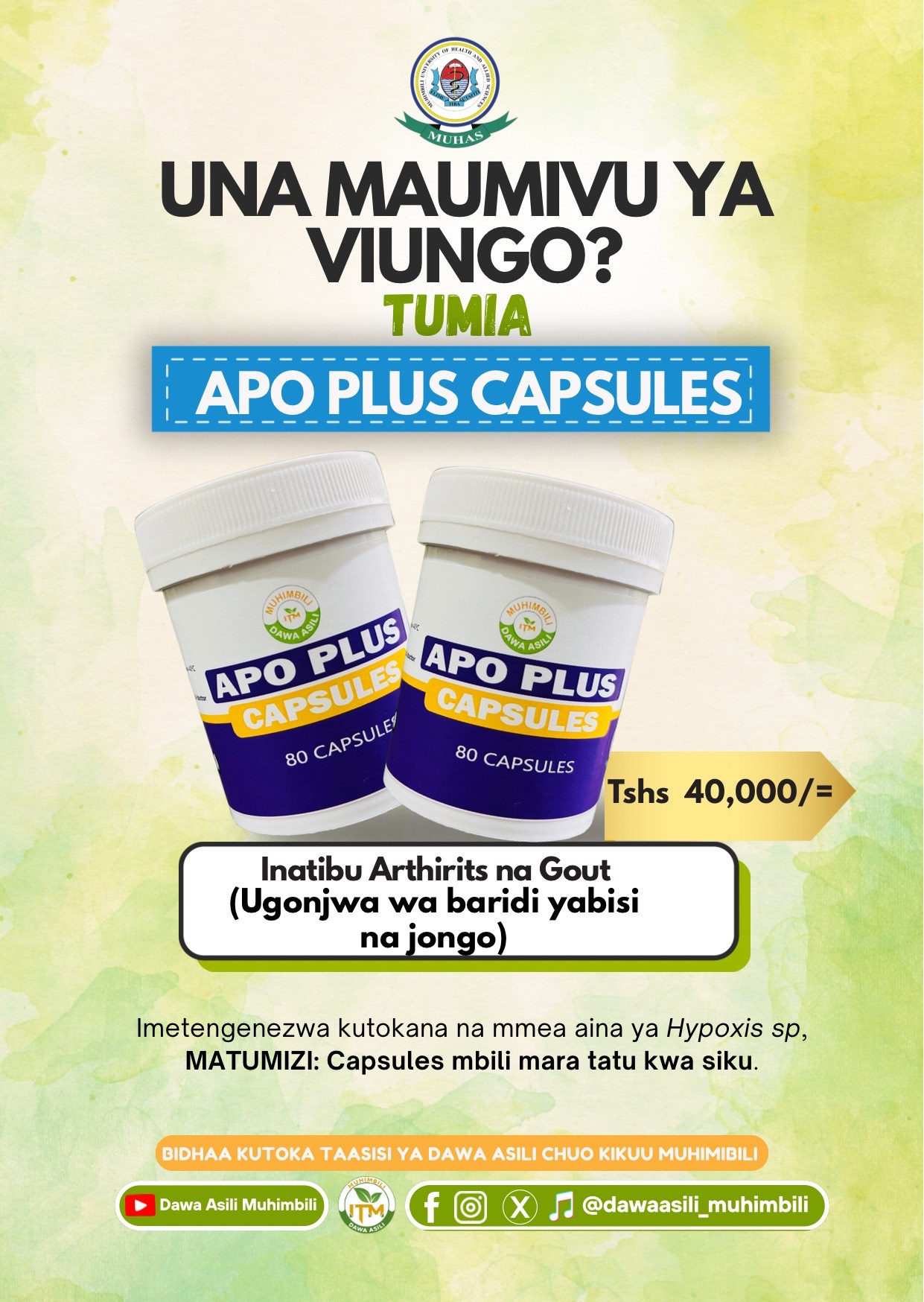
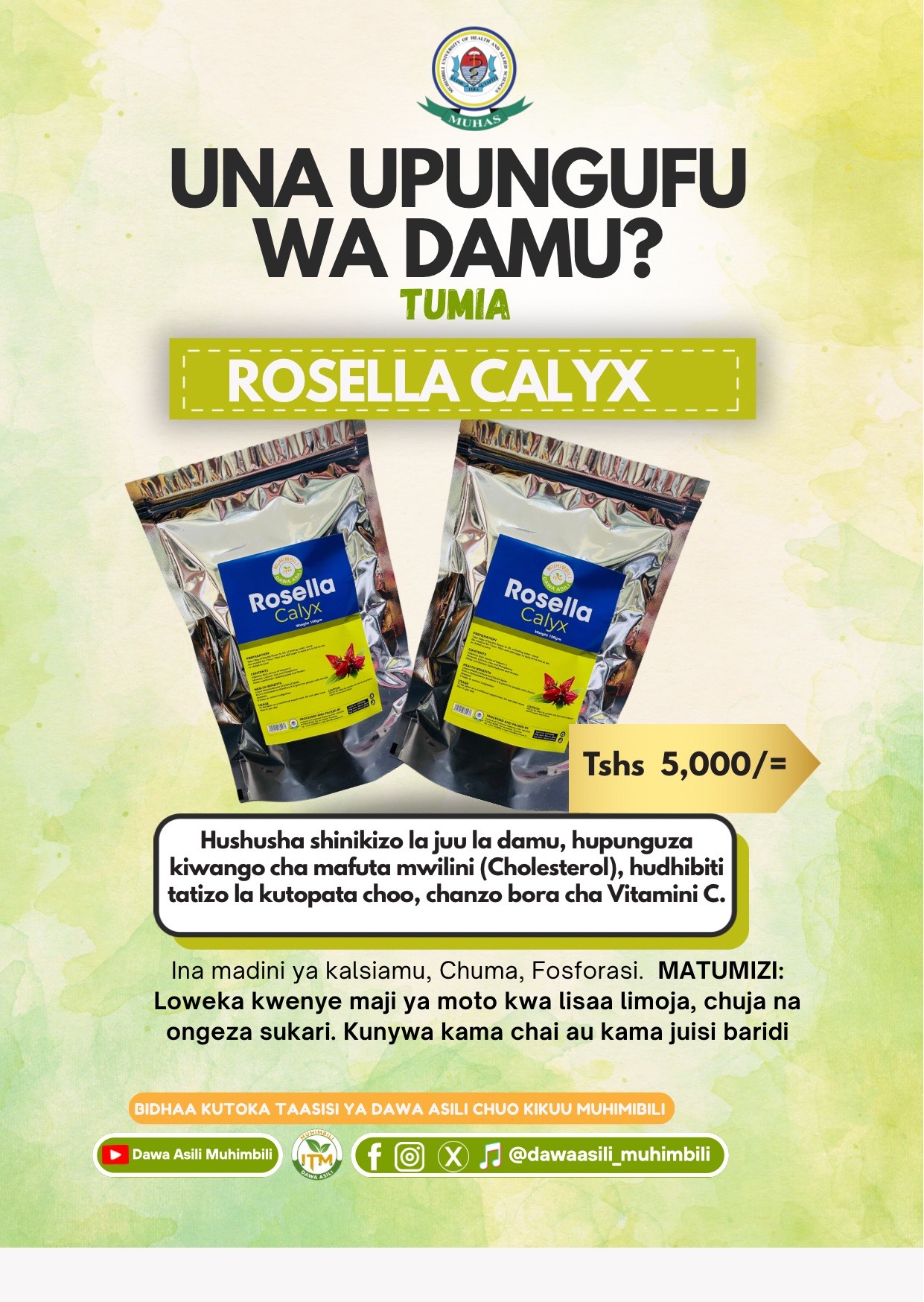
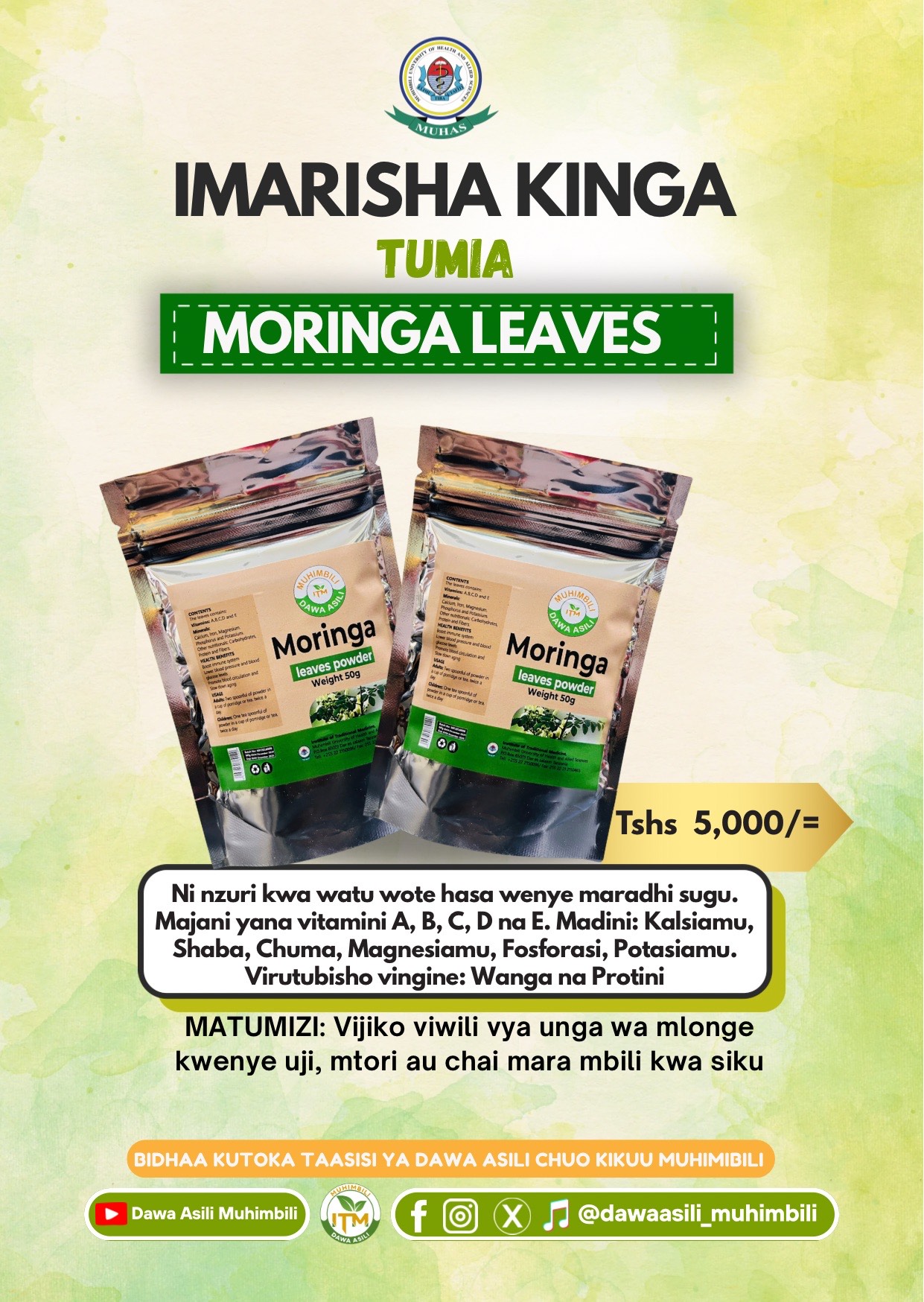
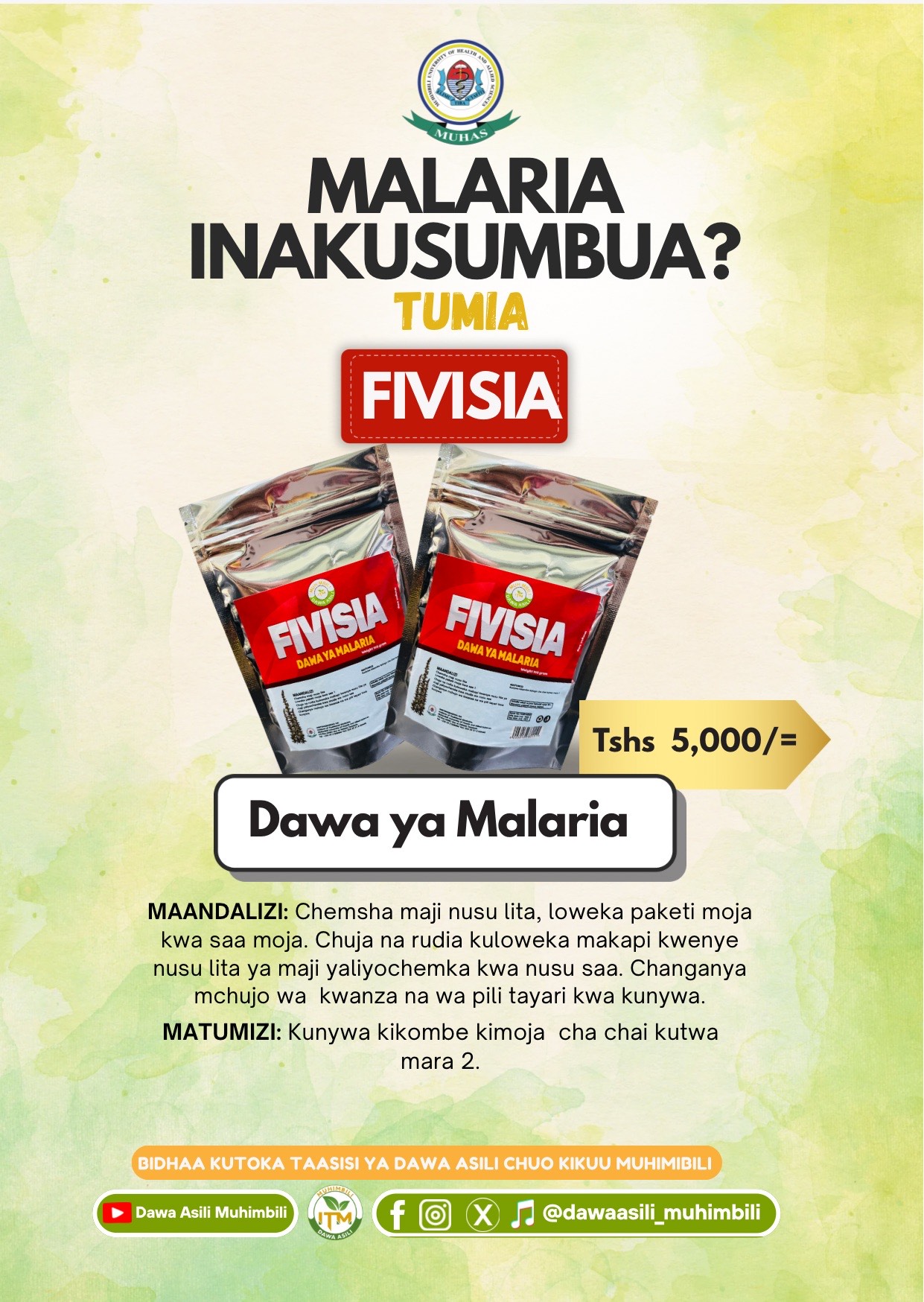
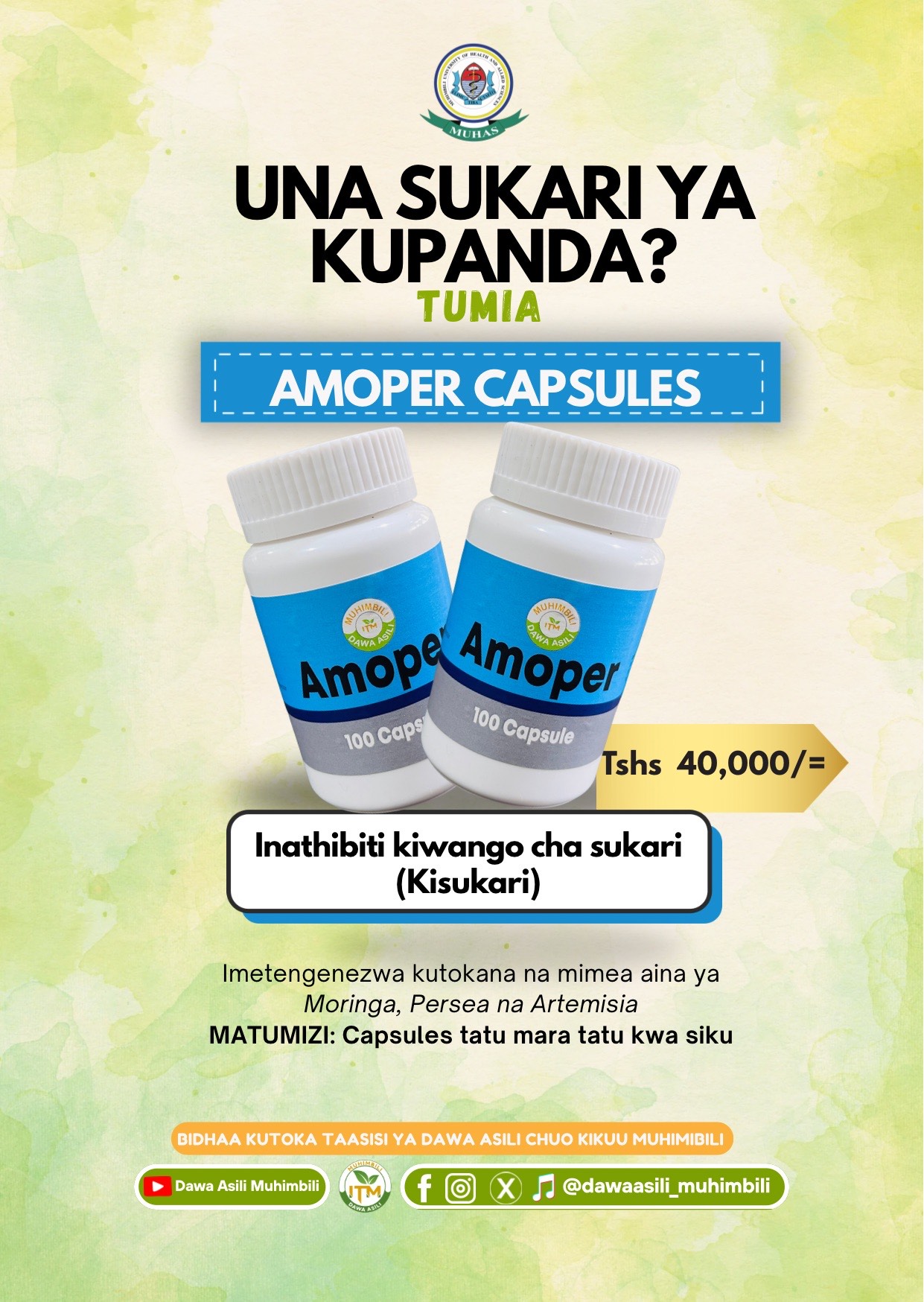
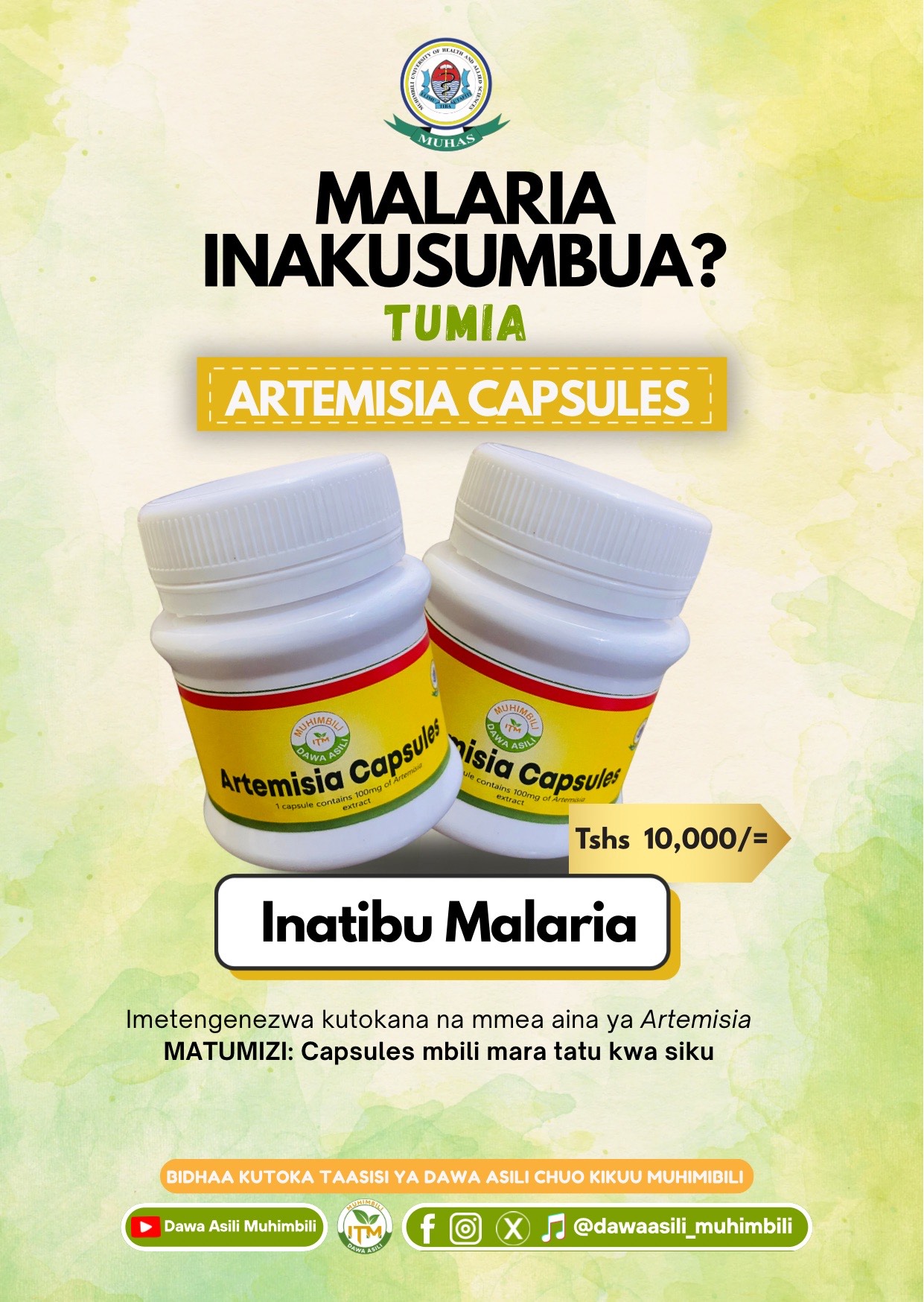
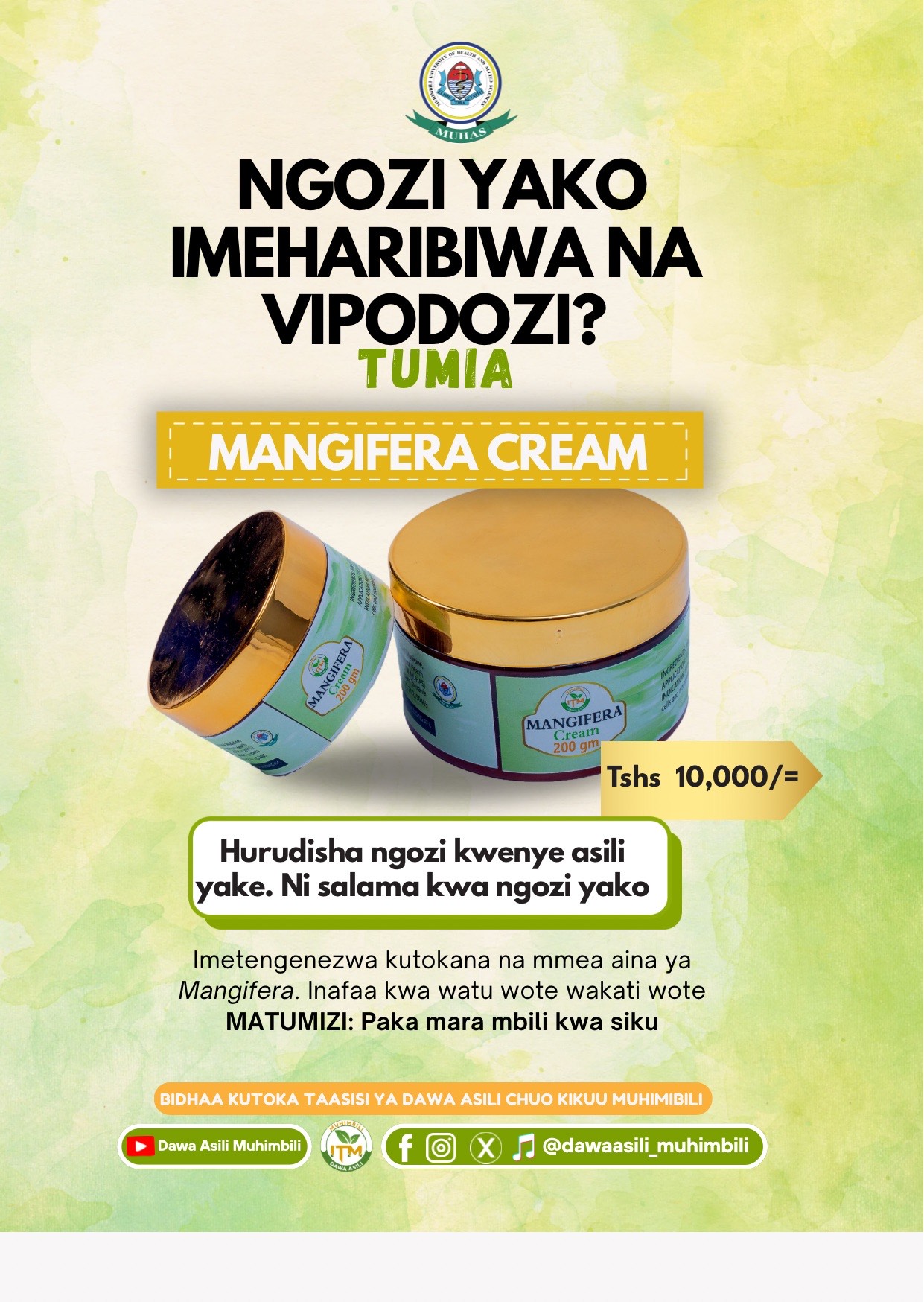
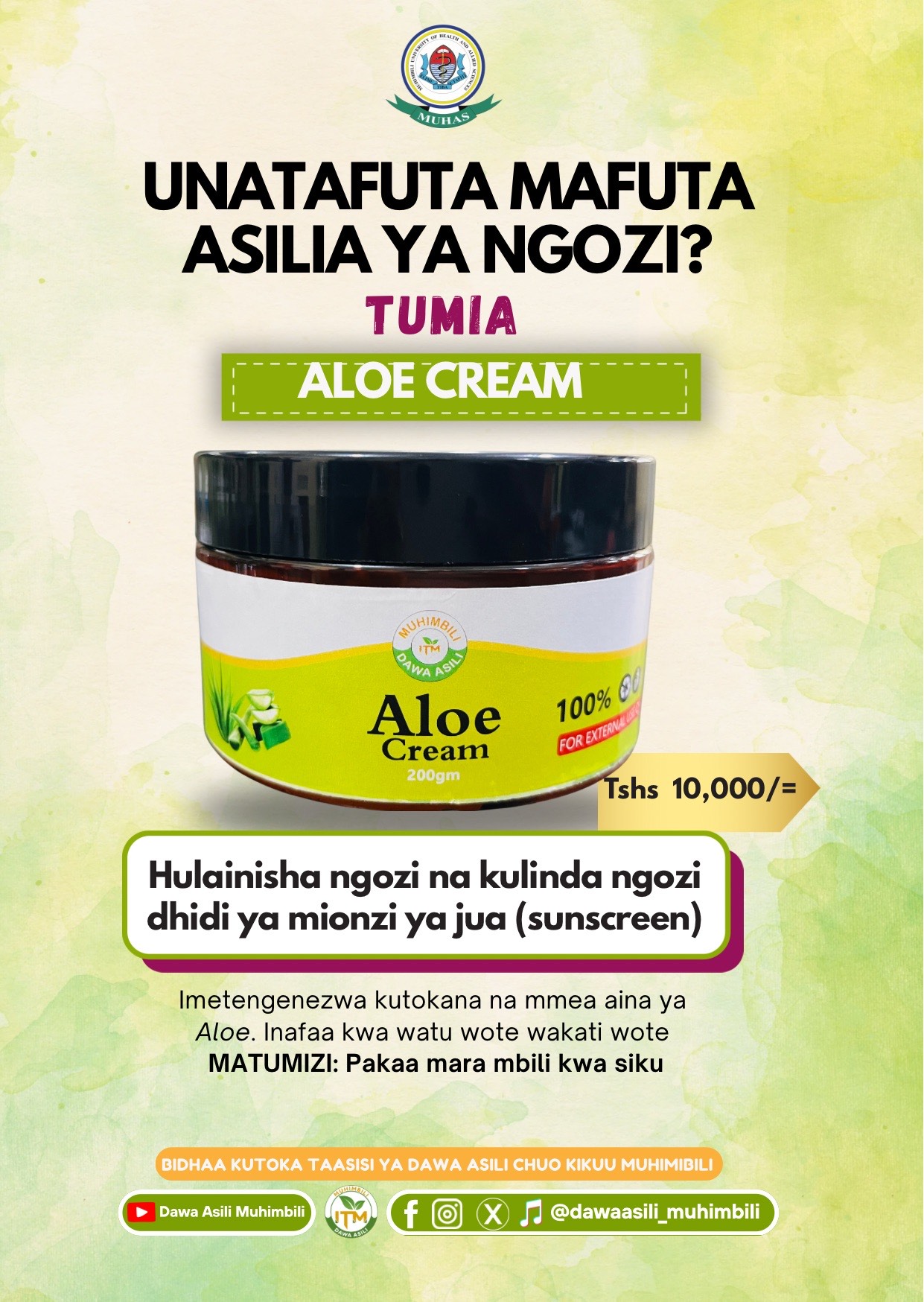
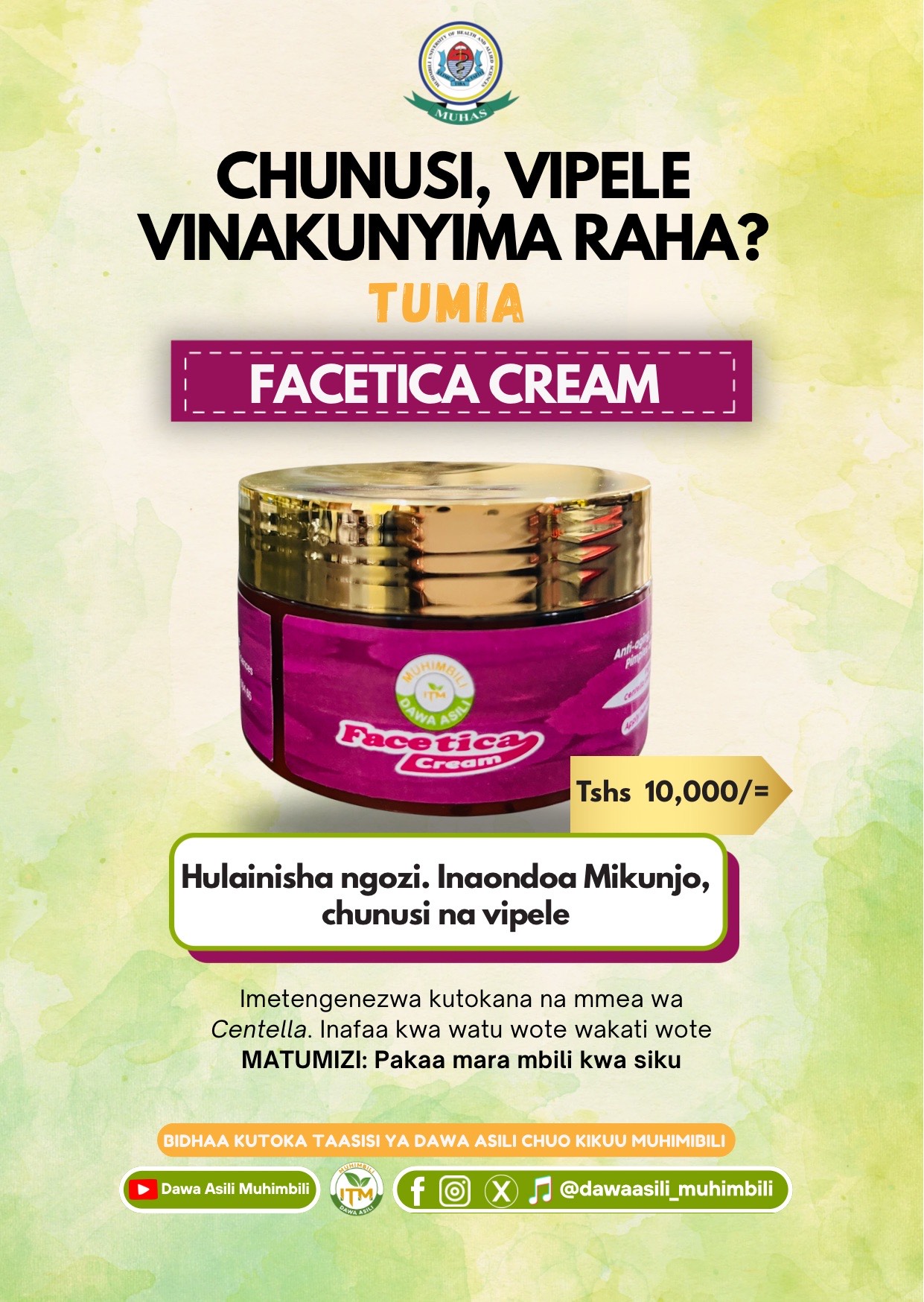
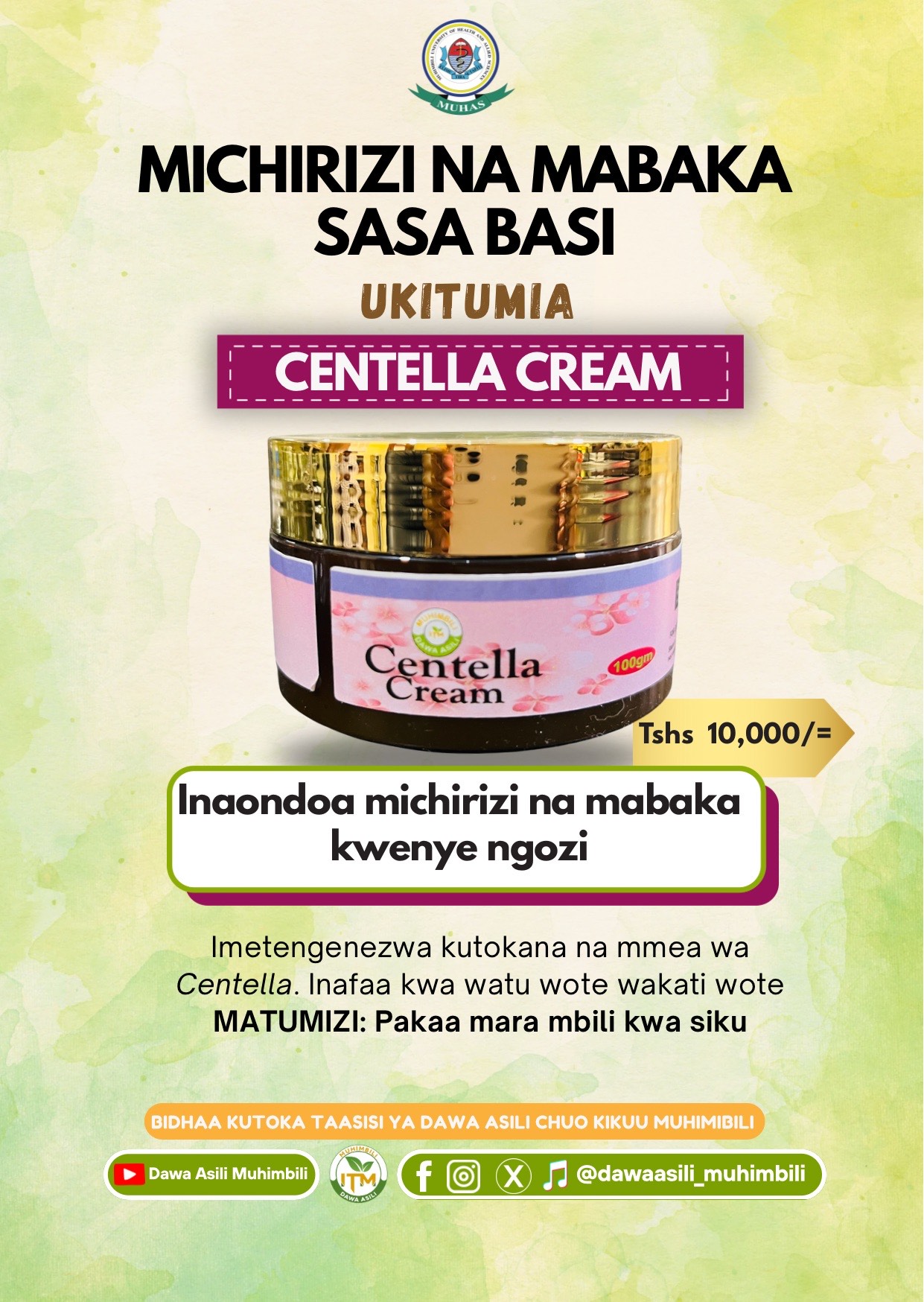
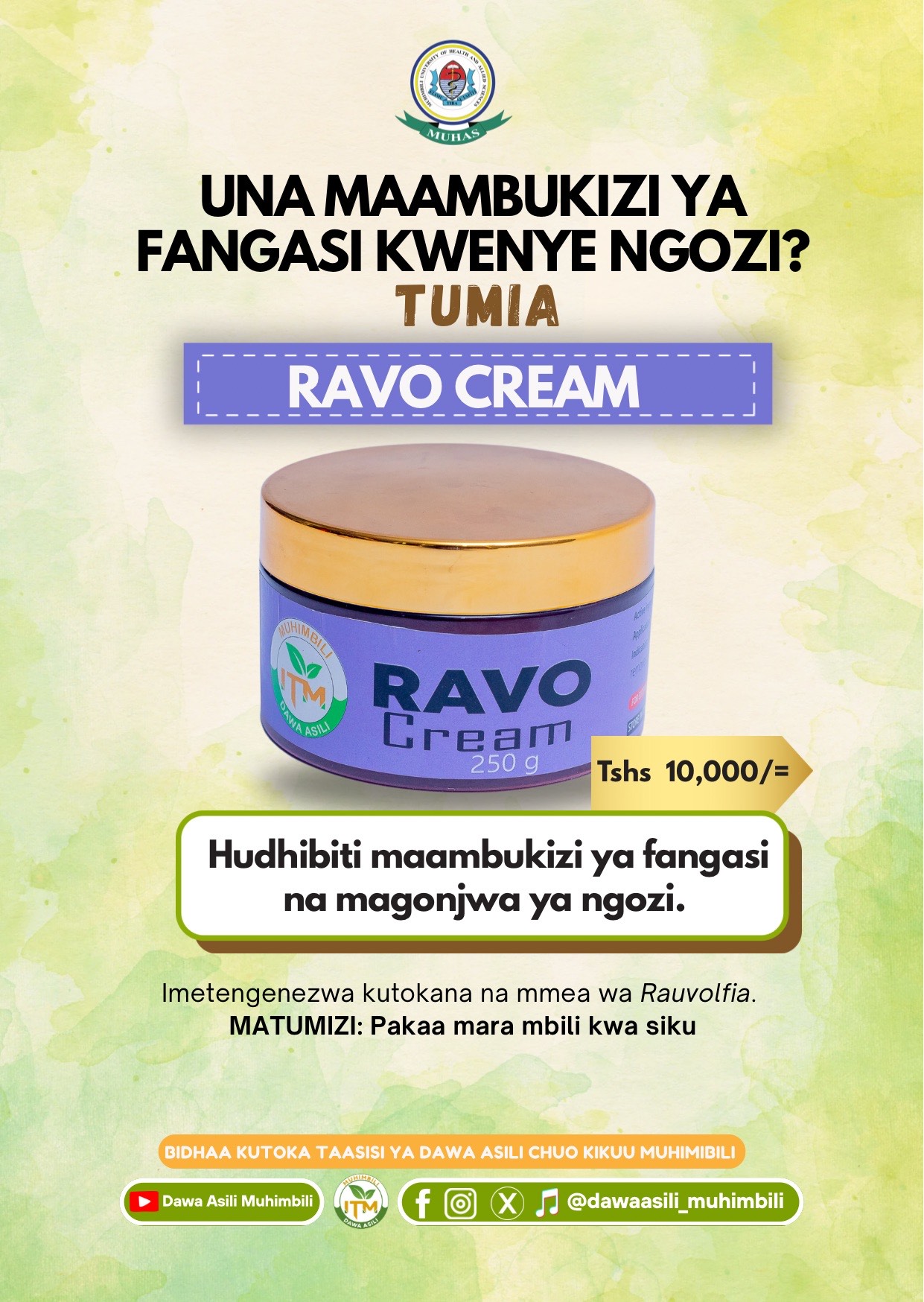
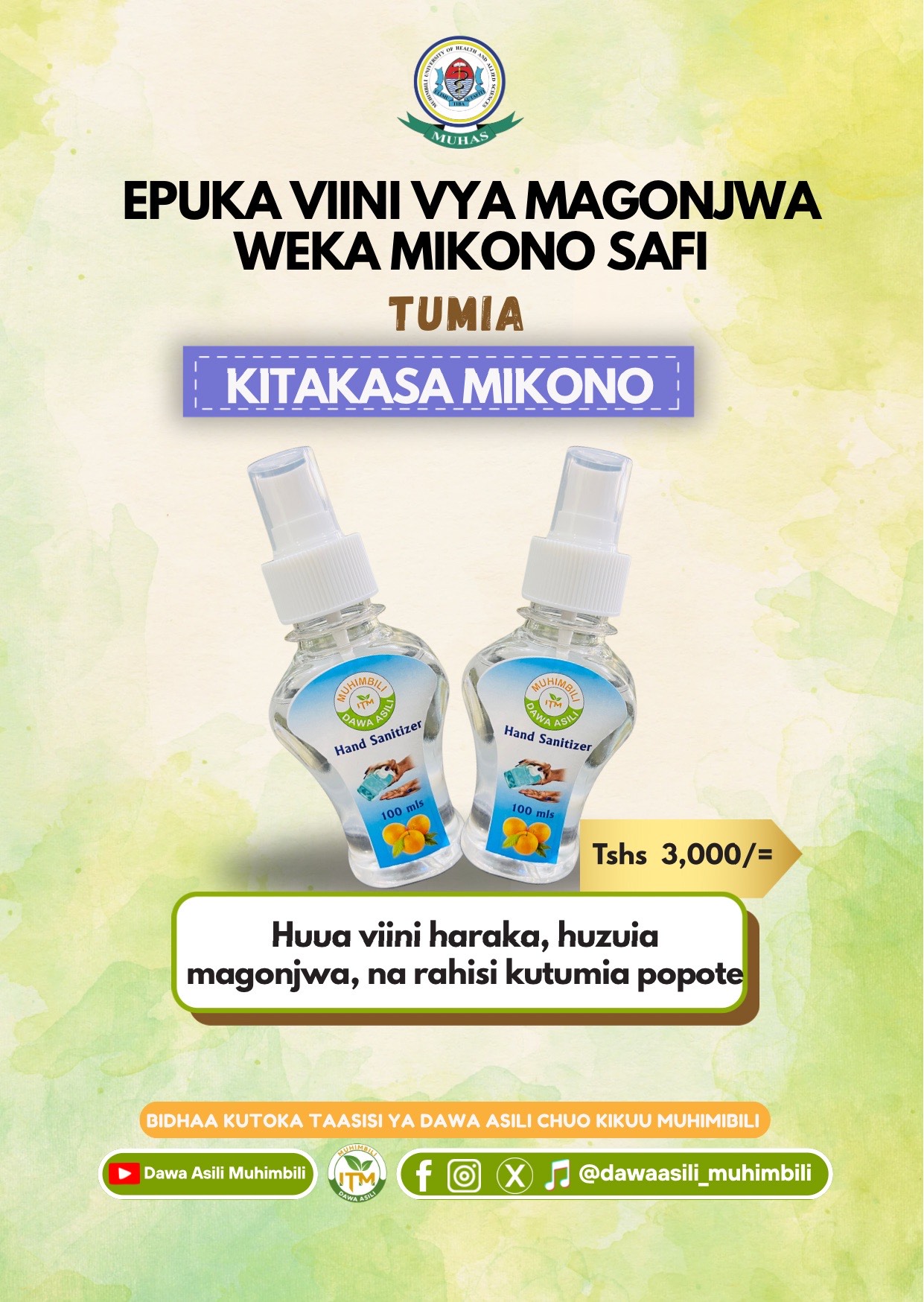
Research
- Anti-TB Natural Products
- Anti-ulcers
- Anti-diabetes
- Malaria
- Health System
- Identification of HIV-1 lead compounds from medicinal plants
- Identification of antibacterial and antifungal agents from medicinal plants
Announcements
Short Course on Traditional Medicine Development Level
Short Course on Traditional Medicine Development Level II
Short Course on Traditional Medicine Development Level III
Downloads
Annual Report
News Bulletin
SOPs
Policies Doc
Fliers/Vipeperushi
List of Our Publications
| Name of Publication | Author/s | OCID-Link |
|---|---|---|
| Antimicrobial Activity and Brineshrimp Toxicity of Extracts of Terminalia brownii Roots and Stem. African Journal of Traditional, Complementary and Alternative Medicines. 2007, 7:9 | Zakaria H. Mbwambo, Mainen J. Moshi, Pax J Masimba, Modest C. Kapingu, Ramadhani S.O. Nondo. | |
| Antimicrobial and brine shrimp toxicity of some plants used in traditional medicine in Bukoba District, north-western Tanzania. Tanzania Journal of Health Research. 2009, 11(1): 23-28 | M.J. Moshi, E. Innocent, P.J. Masimba, D.F. Otieno, A. Weisheit, P. Mbabazi, M. Lynes, K. Meachem, A. Hamilton and I. Urassa. | |
| Prevalence of Drug Resistance Mutations and HIV Type 1 Subtypes in an HIV Type 1-Infected Cohort in Rural Tanzania. AIDS Research and Human Retroviruses. 2013, 29 (9): 1229-1236 | Pax Masimba, Elimsaada Kituma, Thomas Klimkait, Edit Horvath, Marcel Stoeckle, Christoph Hatz, Erick Mossdorf, Emmanuel Mwaigomole, Salim Khamis, Boniphace Jullu, Salim Abdulla, Marcel Tanner, and Ingrid Felger. | |
| Biological Potential of Extracts and compounds from Mammea usambarensis Verdc Fruit. J Adv Sci Res, 2014, 5(3): 07-12 | Pax J. Masimba, Joseph J. Magadula, Zaituni Msengwa, Rose B. Tarimo, Zakariah H. Mbwambo, Matthias Heydenreich, Dimitri Breard, Pascal Richomme , Eltayeb Fadul Fadul Alla. | |
| Oral Acute Toxicity Study of Annona squamosa l. Leaves Extract and Fractions in Albino Mice. Journal of Advanced Scientific Research, 2016, 7 (1)-38-42 | Pax J. Masimba, Ester Innocent and Baraka Samwel. | |
| Suitability of Constructed Wetland Treated Domestic Wastewater as Source of Irrigation Water and Nutrients on Common Beans (Phaseolus vulgaris L.) Performance in Morogoro, Tanzania. International Journal of Agriculture, Environment and Bioresearch-IJAEB, 3(05), 33-44. | A.M.S Nyomora.1 J.H.Y Katima.2 and Ernest B.3 (2018): | |
| The Effect of Field Applied Biochar as a Climate Change Mitigation Strategy to Enrich Soil and Improve Productivity of Okra. Book of Abstracts, University of Dar es Salaam. | Nyomora A.M.S.1 and Ernest B.2 (2019). | |
| Experience on healthcare utilization in seven administrative Regions of Tanzania, Journal of Ethnobiology and Ethnomedicine, 8:5 | Kayombo, EJ, FC Uiso and Mahunnah RLA (2012) | |
| Edmund J. Kayombo, Rogasian L. A. Mahunnah and Febronia FC Uiso (2013) Prospects and challenges of Medicinal plants conservation and traditional medicine in Tanzania, Anthropology Vol 1 issue 3 , 1000108 | Edmund J. Kayombo, Rogasian L. A. Mahunnah and Febronia FC Uiso (2013) | |
| Birth preparedness and complication Readness a Qualitive study Among Community in Rural Tanzania, Global health Action, 8 | August F, Andrea B.Pembe, Edmund Kayombo, Columba Mbekenga, Pia Axemo and Elizabeth darj (2015) | |
| Commonly used Plants for Various Health Conditions in Mlangali Ward, Ludewa District Tanzania. Journal of Scientific Research and Reports, 9(1): 1-16. | Edmund J. Kayombo (2016) | |
| Attitude and use of Female Condoms Among Female Undergraduates Students in University of Dar-es-Salaam, Journal of Scientific Research and Reports, 9(2): 1-10 | Regina Mutayangulwa and Edmund J. Kayombo (2016) Knowledge , | |
| Nakuzelwa DE and Kayombo EJ (2016) Knowledge and Utilization of PMTCT among HIV Positive Women Attending Postnatal Clinic at Bariadi District Hospital, Tanzania; Journal of Scientific Research & Reports 12(6): 1-10, 2016; Article no.JSRR.27090 | Nakuzelwa DE and Kayombo EJ (2016) | |
| Disclosure of HIV Status Among People living with HIV and AIDS : The Dar-Es-Salaam City, Tanzania Experiences Ew J Epidemiol & Clin Med 2017, 3(1): 46 – 54 | Kayombo, EJ (2017) | |
| Evaluation of Root Extract of Cyphostemma Adenocaule (Vitaceae) for Antioxidant Activity, Brine Shrimp Toxicity, and Antiproliferative Activity against Hela Cervical Cancer Cells. International Journal of Medicinal Plants and Natural Products. 7(1), 19-27 | Daniel Zacharia Matata D. Z., Machumi F., Ngassapa O. D., Moshi M. J., Mafumiko F. M. S., Oosthuizen K., Swanepoel B., Venables L., Koekemoer T. C., Kazyoba P. E., van de Venter M. (2021). | |
| Two mosquito larvicidal arabinofuranosidetridecanol from Commiphora merkeri exudate. Natural Product Research, 35(11) | Samwel B, Innocent E, Machumi F, Kisinza W.N, Heydenreich M. (2021). | |
| Seasonal Impacts on Antifungal Activity and Chemical Composition of Extracts from Medicinal Plants Turraea holstii and Clausena anisata. Journal of Médicinal Plants Research, 15(4): 133-139 | Machumi F, Innocent E, Yanda P. (2021). | |
| Chemical composition of essential oils from Eucalyptus globulus and Eucalyptus maculata grown in Tanzania. Scientific African. 12 (2021) e00758 | Almas I., Innocent E., Machumi F., Kisinza W. (2021). | |
| In vitro antioxidant and cytotoxic activity of the root extract of Aspilia mossambicensis (Oliv) Wild (Asteraceae). Journal of Medicinal Plants Research, 14(11): 613-624 | Matata D. Z., Ngassapa O. D., Moshi M. J., Machumi F., Oosthuizen K., Swanepoel B., Venables L., Koekemoer T., Heydenreich M., Kazyoba P. E., van de Venter M. (2020). | |
| Assessment of heavy metals in Hibiscus sabdariffa calyces and Moringa oleifera leaves collected from different areas in Tanzania. Journal of Ecobiotechnology, 12: 17-21 | Clovis M., Machumi F, Innocent E. (2020). | |
| Assessment of Quality of Artemisia afra Powder Used as Antimalarial in Tanzania. Science Journal of Chemistry, 8(5): 119-123 | Kheir K. R., Machumi F., Kalala W., Masimba P., Kombo U. M., Ally M. S. (2020). | |
| Isolation of a new cytotoxic compound, 3-((Z)-heptadec-14-enyl) benzene -1-ol from Rhus natalensis root extract. Phytochemistry Letters 36, (120–126) | Matata D. Z., Moshi M. J., Machumi F., Ngassapa O. D., Swanepoel B., Oosthuizen K., Venables L., Koekemoer T., Heydenreich M., Kazyob P. E., Van de Venter M. (2020). | |
| Comparative evaluation of hypoglycemic activity and phytochemical contents of three Tanzanian medicinal plants. International Journal of Herbal Medicine; 8: 58-62 | Credo D., Machumi F., Masimba, P. J., Mwakigonja A. R. (2020). | |
| In vitro study of antifungal compounds from Parinari curatellifolia (Chrysobalanaceae) and Terminalia sericea (Combretaceae). Int. J. Biol. Chem. Sci. 2021;15(1): 367-378. DOI: https://dx.doi.org/10.4314/ijbcs.v15i1.31 | Mbunde, MNV., Mabiki, F., Innocent, E. Andersson, PG. (2021). | |
| Antifungal activity of single and combined extracts of medicinal plants from Southern Highlands of Tanzania. Journal of Pharmacognosy and Phytochemistry 2019; 8(1): 181-187. DOI: https://dx.doi.org/10.4314/ijbcs.v15i1.31 | Mbunde, MNV., Mabiki, F., Innocent, E. Andersson, PG. (2019). | |
| Ethnobotanical survey and toxicity evaluation of medicinal plants used for fungal remedy in the Southern Highlands of Tanzania. Journal of Intercultural Ethnopharmacology. 6(1): 84-96. https://doi.org/10.5455/jice.20161222103956 | Mbunde, MNV., Innocent, E., Mabiki, F. Andersson, PG. (2017). | |
| One-Pot Preparation of Peptide-Doped Metal–Amino Acid Framework for General Encapsulation and Targeted Delivery. ACS Applied Materials & Interfaces, 13(9), 11195-11204. | Mugaka, Benson Peter, Zhang, S., Li, R. Q., Ma, Y., Wang, B., Hong, J., & Xia, X. H. (2021). | |
| Comparison of N- Docosanol and B-Sitosterol Content in the leaf and Stem Bark of Prunus africana Collected from different Geographical Zones in Tanzania. International Journal of Pure Applied Bioscience. 1 (6): 132-138. | Benson Peter Mugaka, J.J., Otieno, Mahunnah, R.L., P. E. Kazyoba, Elianghiringa K., 2013. | |
| Surface Modification of Gold Nanoparticles for Targeted Drug Delivery. In: Pathak Y. (eds) Surface Modification of Nanoparticles for Targeted Drug Delivery. Springer, Cham. https://doi.org/10.1007/978-3-030-06115-9720. | Mugaka Benson Peter., Hu Y., Ma Y., Ding Y. (2019) | |
| Mitochondria: promising organelle targets for cancer diagnosis and treatment. Biomaterial. Sci., 2018, 6, 2786-2797. | Xiao-Shuang Hou, Huai-Song Wang, Benson Peter Mugaka, Gong-Jun Yang and Ya Ding | |
| Short Review on Genotoxic Impurities in Sartans.World Journal of Pharmaceutical Research.10 (11)147-158. | Amari Mohamed Khamis, Charos Tuychi qizi Omonova, Benson Peter Mugaka.(2021) | |
| Clinical Presentations and Predictors of Severe Sickle Cell Disease among Patients Who Attended Muhimbili National Hospital Dar-Es Salaam, Tanzania: A Retrospective Study. Int J Blood Res Disord, 9, 076. | Shija, E. A., Kabakama, C., Mugaka, B. P., Yu-jiao, X., & Shi, Y. (2022). | |
| Two arabinofuranosidetridecanol from Commiphora merkeri exudate and their mosquito larvicidal and cytotoxic activities. Natural Products Research. 27:1-9. doi: 10.1080/14786419.2021.1931866. | Baraka Samwel, Ester Innocent, Francis Machumi, William N Kisinza and Matthias Heydenreich (2021). | |
| Mosquito larvicidal activity of polar extracts from three Kotschya species against Anopheles gambiae. International Journal of Mosquito Research, 2020, 7(3):29-33 | Innocent Daniel, Ester Innocent, Joseph sempombe, Veronica Mugoyela and Baraka Samwel (2020). | |
| Isolation and characterization of mosquito larvicidal compounds from leaves of Kotschya uguenensis (Taub) F. Whote. International Journal of Herbal Medicine, 7(6): 01-04 | Baraka Samwel, Ester Innocent, Francis Machumi, William N Kisinza and Matthias Heydenreich (2019). | |
| Mosquito larvicidal and brine shrimp activities of Commiphora merkeri Engl. (Burseraceae) exudate. International Journal of Mosquito Research, 6(2): 01-04 | Baraka Samwel, Ester Innocent, Francis Machumi and William N Kisinza (2019). | |
| Oral acute toxicity study of Annona squamosa L. leaves extract and fractions in albino mice. Journal of Advanced Scientific Research, 7(1): 38-42 | Masimba P. J., Innocent, E. and Samwel, B. (2016). | |
| Larvicidal Activity of Metarhizium anisopliae and Annona squamosa leaf Extract against Culex quinquefasciatus and Anopheles gambiae larvae. Journal of Applied Life Sciences International, 3(4): 169-176 | Samwel, B., Innocent, E. and Masimba, P. J. (2015). | |

